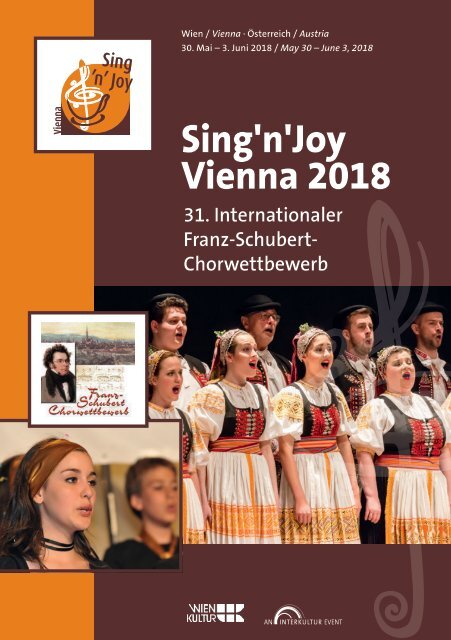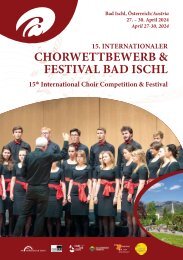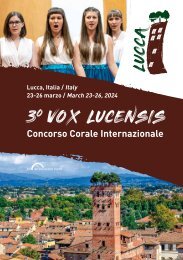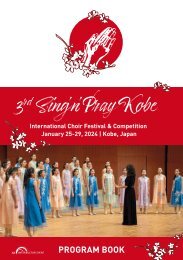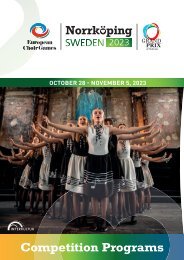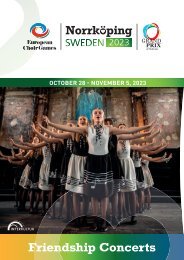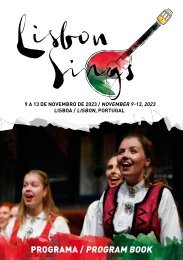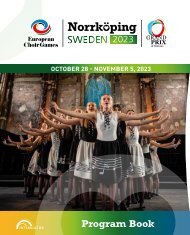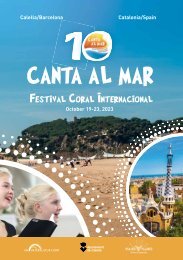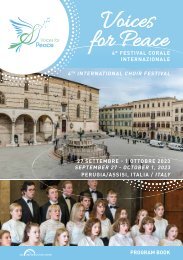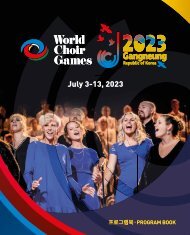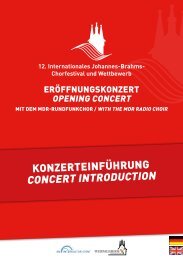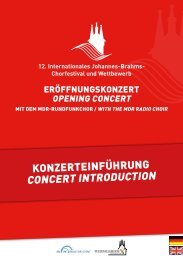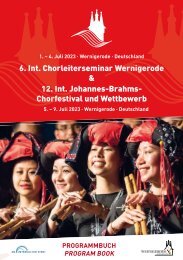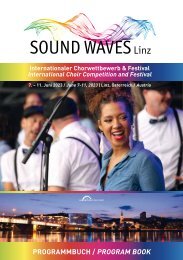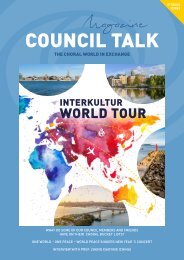Vienna 2018 - Program Book
4th Sing'n'Joy Vienna and 31st International Franz Schubert Choir Competition May 30 - June 3, 2018 Vienna, Austria Sing'n'Joy Vienna! Already for the 31st time, the Franz Schubert Choir Competition and Festival will take place in the European Capital of Music, Vienna. Following the competition’s motto "Sing'n'Joy Vienna" choirs from all over the world will come together from May 30 - June 3, 2018. The Sing'n'Joy concept focuses on the traditional Schubert competition but also features intercultural meetings and performances in Friendship Concerts. The competitions will be taking place in the famous Vienna Concert House ("Konzerthaus Wien"). Austria’s capital attracts singers not only with its inspiring musical tradition and its cultural highlights but with the intimate taverns, shops, traditional sweets and delicacies and the historic architecture of breathtaking Austria. Discover the capital of music and sing with us!
4th Sing'n'Joy Vienna and 31st International Franz Schubert Choir Competition
May 30 - June 3, 2018 Vienna, Austria
Sing'n'Joy Vienna!
Already for the 31st time, the Franz Schubert Choir Competition and Festival will take place in the European Capital of Music, Vienna. Following the competition’s motto "Sing'n'Joy Vienna" choirs from all over the world will come together from May 30 - June 3, 2018.
The Sing'n'Joy concept focuses on the traditional Schubert competition but also features intercultural meetings and performances in Friendship Concerts.
The competitions will be taking place in the famous Vienna Concert House ("Konzerthaus Wien").
Austria’s capital attracts singers not only with its inspiring musical tradition and its cultural highlights but with the intimate taverns, shops, traditional sweets and delicacies and the historic architecture of breathtaking Austria.
Discover the capital of music and sing with us!
- TAGS
- vienna
You also want an ePaper? Increase the reach of your titles
YUMPU automatically turns print PDFs into web optimized ePapers that Google loves.
Wien / <strong>Vienna</strong> · Österreich / Austria<br />
30. Mai – 3. Juni <strong>2018</strong> / May 30 – June 3, <strong>2018</strong><br />
Sing'n'Joy<br />
<strong>Vienna</strong> <strong>2018</strong><br />
31. Internationaler<br />
Franz-Schubert-<br />
Chorwettbewerb
2<br />
INTERKULTUR EVENTS 2019<br />
REGISTRATION DATES<br />
Early Bird Regular<br />
FEB<br />
7<br />
International Choir Competition Maastricht<br />
February 7 – 11, 2019<br />
Maastricht, Netherlands<br />
<strong>2018</strong><br />
JUN<br />
11<br />
<strong>2018</strong><br />
SEP<br />
24<br />
FEB<br />
14<br />
2 nd Sing‘n‘Joy Princeton - The American International Choral Festival Princeton (NJ), USA<br />
February 14 – 18, 2019<br />
<strong>2018</strong><br />
JUL<br />
30<br />
<strong>2018</strong><br />
OCT<br />
1<br />
MAY<br />
1<br />
Voices for Peace - International Choir Festival<br />
May 1 – 5, 2019<br />
Perugia/Assisi, Italy<br />
<strong>2018</strong><br />
SEP<br />
24<br />
<strong>2018</strong><br />
DEC<br />
10<br />
MAY<br />
1<br />
RIGA SINGS<br />
May 1 – 5, 2019<br />
Riga, Latvia<br />
MAY<br />
15<br />
6 th Vietnam International Choir Competition Hoi An, Vietnam<br />
May 15 – 19, 2019<br />
<strong>2018</strong><br />
OCT<br />
15<br />
<strong>2018</strong><br />
DEC<br />
17<br />
MAY<br />
29<br />
Sing Along Concert “ON TOUR” Barcelona<br />
May 29 – June 2, 2019<br />
Barcelona, Spain<br />
JUN<br />
19<br />
7 th International Anton Bruckner Choir Competition & Festival<br />
June 19 – 23, 2019<br />
Linz, Austria<br />
<strong>2018</strong><br />
NOV<br />
12<br />
2019<br />
JAN<br />
21<br />
JUN<br />
29<br />
5 th International Conductor‘s Seminar Wernigerode<br />
June 29 – July 2, 2019<br />
Wernigerode, Germany<br />
JUL<br />
3<br />
11 th International Johannes Brahms Choir Festival & Competition<br />
July 3 – 7, 2019<br />
Wernigerode, Germany<br />
<strong>2018</strong><br />
NOV<br />
26<br />
2019<br />
FEB<br />
11<br />
Summer Highlight<br />
AUG<br />
3<br />
Grand Prix of Nations Gothenburg 2019 & 4 th European Choir Games<br />
August 3 – 10, 2019<br />
Gothenburg, Sweden<br />
<strong>2018</strong><br />
OCT<br />
15<br />
<strong>2018</strong><br />
DEC<br />
10<br />
OCT<br />
9<br />
3 rd Kalamata International Choir Competition and Festival<br />
October 9 – 13, 2019<br />
Kalamata, Greece<br />
2019<br />
MAR<br />
11<br />
2019<br />
MAY<br />
27<br />
OCT<br />
23<br />
8 th Canta al mar - Festival Coral Internacional Calella/Barcelona,<br />
Spain<br />
October 23 – 27, 2019<br />
2019<br />
MAR<br />
18<br />
2019<br />
JUN<br />
3<br />
NOV<br />
14<br />
NOV<br />
15<br />
LISBON SINGS<br />
November 14 – 18, 2019<br />
Singers in Residence - A Sing Along Project at the Wiener Konzerthaus<br />
November 15 – 18, 2019<br />
Lisbon, Portugal<br />
<strong>Vienna</strong>, Austria<br />
Non-competitive events<br />
ON STAGE - Non-competitive events in 6 destinations.<br />
Please check onstage.interkultur.com for more information on dates and venues<br />
Israel, Verona, Stockholm,<br />
Florence, Lisbon, Prague
3<br />
4. Sing'n'Joy <strong>Vienna</strong> <strong>2018</strong> -<br />
31. Internationaler<br />
Franz-Schubert-Chorwettbewerb<br />
4 th Sing'n'Joy <strong>Vienna</strong> <strong>2018</strong> -<br />
31 st International Franz Schubert Choir Competition<br />
30. Mai – 3. Juni <strong>2018</strong>, Wien, Österreich<br />
May 30 – June 3, <strong>2018</strong>, <strong>Vienna</strong>, Austria<br />
Veranstalter / Organizer<br />
Förderverein INTERKULTUR Österreich<br />
in Zusammenarbeit mit / in cooperation with<br />
Schubert-Gesellschaft Wien-Lichtental<br />
unterstützt von / supported by<br />
Stadt Wien<br />
Chorverband Österreich<br />
ChorForum Wien<br />
Ehrenschutz / Patronage<br />
Kardinal Dr. Christoph Schönborn, Erzbischof von Wien / Archbishop of <strong>Vienna</strong><br />
Dr. Michael Häupl, Bürgermeister der Bundeshaupstadt Wien /<br />
Mayor of the Federal Capital of <strong>Vienna</strong><br />
Ehrenpräsidium / Honorary Presidency<br />
Botschafter i.R. Dr. Walter Hagg, Präsident der / President of the Schubert-Gesellschaft Wien-Lichtental<br />
Regierungsrat Prof. Herbert Wild, Ehrenpräsident des Österreichischen Chorverbandes /<br />
Honorary President of the Austrian Choral Association<br />
Präsident / President INTERKULTUR<br />
Günter Titsch (Deutschland / Germany)<br />
Künstlerisches Komitee / Artistic Committee<br />
Prof. Dr. Ralf Eisenbeiß (Deutschland / Germany), Leitender Künstlerischer Direktor / Senior Artistic<br />
Director<br />
Prof. Mag. Friedrich Lessky (Österreich / Austria)<br />
Johan Rooze (Niederlande / Netherlands)<br />
Fred Sjöberg (Schweden / Sweden), Künstlerischer Generaldirektor / General Artistic Director<br />
Assoc. Prof. Romāns Vanags (Lettland / Latvia)<br />
INTERKULTUR Präsidium / Executive Committee<br />
Günter Titsch (Deutschland / Germany)<br />
Qin Wang (China)<br />
Stefan Bohländer (Deutschland / Germany)<br />
Dr. Christoph Wirtz (Deutschland / Germany), Generalsekretär / Secretary General
THE AMERICAN<br />
4 INTERNATIONAL<br />
CHORAL<br />
FESTIVAL<br />
FEB 14 - 18, 2019<br />
PRINCETON, USA<br />
PRINCETON.INTERKULTUR.COM
5<br />
Inhaltsverzeichnis / Table of Contents<br />
Seite / Page<br />
Veranstalter / Organizer 3<br />
Inhaltsverzeichnis / Table of Contents 5<br />
Teilnehmerländer / Participating Countries 6<br />
Grußworte / Greetings 8<br />
• Günter Titsch, Präsident / President INTERKULTUR<br />
• Dr. Michael Häupl, Bürgermeister der Bundeshauptstadt Wien /<br />
Mayor of the Federal Capital of <strong>Vienna</strong><br />
• Kardinal Dr. Christoph Schönborn, Erzbischof Wien / Archbishop of <strong>Vienna</strong><br />
• DDr. Karl-Gerhard Straßl, Präsident Chorverband Österreich /<br />
President Austrian Choral Association<br />
• Botschafter i.R. Dr. Walter Hagg, Präsident der Schubert-Gesellschaft Wien-Lichtental /<br />
President of the Schubert Society <strong>Vienna</strong>-Lichtental<br />
Förderverein INTERKULTUR / About INTERKULTUR 16<br />
• ... Brücken der Begegnung / … Connecting Bridges<br />
Franz-Schubert-Chorwettbewerb / Franz Schubert Choir Competition 24<br />
• Schubertgesellschaft Wien-Lichtental / Schubert Society <strong>Vienna</strong>-Lichtental<br />
• Preisträger der bisherigen Wettbewerbe / Prize winners of the previous competitions<br />
• Gewinner des Franz-Schubert-Chorpreises 2016 / Winner of the Franz Schubert Choir Prize 2016<br />
KAPITELÜBERSCHRIFT<br />
KAPITELÜBERSCHRIFT<br />
Künstlerisches Komitee und Jury / Artistic Committee and Jury 30<br />
• Prof. Dr. Ralf Eisenbeiß (Deutschland / Germany)<br />
• Prof. Mag. Friedrich Lessky (Österreich / Austria)<br />
• Johan Rooze (Niederlande / Netherlands)<br />
• Josef Habringer (Österreich / Austria)<br />
• Jakub Neske (Polen / Poland)<br />
• Josep Prats (Spanien / Spain)<br />
Allgemeiner Ablauf / General Schedule 38<br />
• Eröffnungskonzert / Opening Concert<br />
• Freundschaftskonzerte / Friendship Concerts<br />
Wettbewerb / Competition 50<br />
• Veranstaltungsorte / Venues<br />
• Wettbewerbe / Competitions<br />
Chöre / Choirs 62<br />
Impressum & Team / Imprint & Team 74<br />
Hinweise / Notes 75
6<br />
Teilnehmerländer / Participating Countries<br />
Chinese Taipei<br />
Philippinen /<br />
Philippines<br />
Dänemark / Denmark<br />
Russland / Russia<br />
Estland / Estonia<br />
Singapur / Singapore<br />
Indonesien / Indonesia<br />
Spanien / Spain<br />
Norwegen / Norway<br />
Türkei / Turkey<br />
Österreich / Austria<br />
USA<br />
Polen / Poland<br />
Vietnam
7<br />
6th VIETNAM INTERNATIONAL<br />
CHOIR COMPETITION<br />
Ộ
8
GRUSSWORTE<br />
GREETINGS<br />
9
10<br />
Günter Titsch<br />
Präsident INTERKULTUR<br />
President INTERKULTUR<br />
Dear friends of choral music,<br />
Liebe Freunde der Chormusik,<br />
ich begrüße Sie sehr herzlich zum 31.<br />
Internationalen Franz-Schubert-Chorwettbewerb<br />
in Wien. Es ist sehr schön, dass wir wieder 18 Chöre<br />
aus 12 Nationen willkommen heißen können,<br />
aus fernen Ländern wie Vietnam, Chinese Taipei,<br />
Indonesien und USA, aber auch aus der Türkei,<br />
Russland und Estland sind Gruppen angereist. Das<br />
zeigt uns, welche Bedeutung dieser traditionelle<br />
Wettbewerb im Reigen der INTERKULTUR<br />
Veranstaltungen einnimmt.<br />
Ich darf wiederum dem Gründer des Wettbewerbs,<br />
Herrn Prof. Friedrich Lessky, und unseren Freunden<br />
der Schubert-Gesellschaft Wien-Lichtental für die<br />
langjährige und kontinuierliche Unterstützung<br />
herzlich danken.<br />
In genau einem Monat werden wir den<br />
größten Chorwettbewerb der Welt, die 10.<br />
World Choir Games Tshwane <strong>2018</strong> erstmalig<br />
auf dem afrikanischen Kontinent eröffnen und<br />
INTERKULTUR feiert in diesem Jahr außerdem das<br />
30. jährige Jubiläum. Wo auch immer wir solch<br />
hervorragende Projekte für die internationale<br />
Chorwelt präsentieren, überall gilt für uns der<br />
Slogan „Singing together brings nations together“.<br />
Und der Schubert-Wettbewerb in Wien trägt dazu<br />
in hervorragender Weise bei.<br />
Ich wünsche Ihnen viel Erfolg im Wettbewerb und<br />
Freude beim Zuhören!<br />
It is my pleasure to welcome you to the 31 st International<br />
Franz Schubert Choir Competition in<br />
<strong>Vienna</strong>. We are happy to count 18 participating<br />
choirs from 12 nations, particularly from such<br />
far-flung destinations as Vietnam, Chinese Taipei<br />
and Indonesia. From the USA we can even<br />
welcome three choirs, but also groups from Turkey,<br />
Russia and Estonia have travelled all the way<br />
to <strong>Vienna</strong> to participate in this event. This shows<br />
the significance of this traditional competition<br />
within the INTERKULTUR event series.<br />
I would like to express my thanks to the founder<br />
of the competition, Prof. Friedrich Lessky, and our<br />
friends of the Schubert Society Wien-Lichtental<br />
for their continuous support throughout the<br />
years.<br />
In exactly one month we will open the world's<br />
biggest choir competition, the 10 th World Choir<br />
Games Tshwane <strong>2018</strong> which will take place on<br />
the African continent for the first time. Moreover<br />
INTERKULTUR celebrates its 30 th anniversary<br />
this year. Wherever we stage such outstanding<br />
projects for the international choral world, the<br />
slogan "Singing together brings nations together"<br />
applies. And the Schubert Competition<br />
in <strong>Vienna</strong> is an outstanding contribution to this.<br />
I wish good luck to all singers and great moments<br />
of music!<br />
Günter Titsch<br />
Präsident INTERKULTUR<br />
President INTERKULTUR
11<br />
Dr. Michael Häupl<br />
Bürgermeister der Bundeshauptstadt Wien<br />
Mayor of the Federal Capital of <strong>Vienna</strong><br />
Wien ist nicht nur Welthauptstadt der Musik,<br />
das reiche Spektrum kultureller Angebote<br />
macht die österreichische Bundeshauptstadt<br />
zu einer der führenden Kulturmetropolen überhaupt.<br />
Das hat mehrere Gründe, wie etwa die<br />
vielen Komponisten und Musiker, die in Wien<br />
im Laufe der vergangenen Jahrhunderte gelebt<br />
und gewirkt haben. Aber auch die Wiener<br />
Institutionen mit ihrer großen Tradition, die<br />
diesen Ruf dauerhaft lebendig erhalten und<br />
in die ganze Welt hinaustragen, leisten ihren<br />
Beitrag zu Wiens musikalischem Renommee.<br />
Der Bogen reicht dabei von den weltberühmten<br />
Wiener Philharmonikern über die Wiener<br />
Sängerknaben bis zu den einzigartigen Aufführungsstätten<br />
wie Musikverein, Konzerthaus<br />
oder Staatsoper.<br />
Auch der internationale Franz-Schubert-Chorwettbewerb,<br />
der heuer zum 31. Mal stattfindet,<br />
belebt die Musiklandschaft unserer Stadt<br />
und ist mittlerweile zu einer solchen Institution<br />
geworden. Ich heiße alle Gäste aus dem Inund<br />
Ausland herzlich in der österreichischen<br />
Bundeshauptstadt willkommen und wünsche<br />
Ihnen viel Erfolg und Freude am Singen sowie<br />
allen BesucherInnen der Konzerte viel Vergnügen<br />
beim Zuhören!<br />
<strong>Vienna</strong> is not only the world capital of music, it is<br />
the immense range of its cultural life that makes<br />
Austria’s federal capital one of the leading cultural<br />
metropolises around the globe. One can find<br />
many reasons for this. There are the numerous<br />
composers and musicians who through the centuries<br />
chose <strong>Vienna</strong> to be the center of their lives<br />
and the source of inspiration for their work. Another<br />
reason for the outstanding renown <strong>Vienna</strong><br />
has acquired in the field of music is surely also to<br />
be attributed to the large number of prestigious<br />
institutions located in <strong>Vienna</strong> that can look back<br />
on long traditions and that have created this reputation<br />
over time, keep it alive and carry it into<br />
all the world: There are, to mention only a few,<br />
the world-famous <strong>Vienna</strong> Philharmonic Orchestra<br />
and the <strong>Vienna</strong> Boys’ Choir, and there are the<br />
magnificent performance venues like the <strong>Vienna</strong><br />
Music Society, the Wiener Konzerthaus, and the<br />
<strong>Vienna</strong> State Opera.<br />
It goes without saying that the Franz Schubert<br />
Choir Competition is yet another gem that<br />
makes the musical life of our city even richer.<br />
The competition has become a veritable institution<br />
itself, which takes place for the 31 st time<br />
this year already. I would like to extend a warm<br />
welcome to all visitors from home and abroad<br />
to the Austrian federal capital of <strong>Vienna</strong>. I wish<br />
good luck and success to all singers and great<br />
moments of music and a wonderful time to the<br />
concert audience and all our guests!<br />
Dr. Michael Häupl<br />
Bürgermeister der Bundeshauptstadt Wien<br />
Mayor of the Federal Capital of <strong>Vienna</strong>
12<br />
Kardinal Dr. Christoph<br />
Schönborn<br />
Erzbischof von Wien<br />
Archbishop of <strong>Vienna</strong><br />
Zum Geleit<br />
Es freut mich sehr, dass in so schöner Regelmäßigkeit<br />
ein internationaler Chorwettbewerb<br />
unter der „Patronanz“ Franz Schuberts<br />
stattfindet, gehört Schubert doch zu jenen<br />
Komponisten, die mir – einem die Musik<br />
zwar nicht aktiv Ausübenden, aber sie sehr<br />
Liebenden – ganz besonders ans Herz gewachsen<br />
sind.<br />
Diese so viele meist junge Menschen aus den<br />
verschiedensten Ländern und Sprachen versammelnde<br />
schöne Initiative weist auf eine<br />
der nobelsten Gaben der Musik hin: auf die<br />
Fähigkeit, Brücken zu schlagen und Gemeinschaft<br />
zu stiften. Musik erzieht uns auch zum<br />
Hinhören, macht aufmerksam auf den Anderen,<br />
öffnet nicht nur die Ohren, sondern auch<br />
das Herz.<br />
Allen Teilnehmerinnen und Teilnehmern, allen<br />
für die Organisation Verantwortlichen<br />
wünsche ich erfüllende Tage, bereichernde<br />
und frohe Begegnungen und tiefe Freude am<br />
kostbaren Geschenk der Musik!<br />
Es grüßt Sie herzlich<br />
Ihr<br />
Preface<br />
I am delighted that an international choral competition<br />
under the „patronage“ of Franz Schubert<br />
takes place regularly, as Schubert belongs to<br />
those composers I have grown fond of although<br />
I do not practise music but love it very much.<br />
This wonderful initiative which assembles<br />
many young people from different countries<br />
speaking different languages points to one of<br />
the most sublime gifts of music: to the ability<br />
to build bridges and to establish a community.<br />
Music makes us listening, calls your attention to<br />
others, does not only open one’s ears, but also<br />
one‘s heart.<br />
I wish all participants and the whole organizing<br />
team fulfilling days, enriching and joyful encounters<br />
and a profound joy over the valuable<br />
gift of music!<br />
With kind regards<br />
Your<br />
Kardinal Dr. Christoph Schönborn<br />
Erzbischof von Wien / Archbishop of <strong>Vienna</strong>
13<br />
DDr. Karl-Gerhard Strasl MAS<br />
Präsident Chorverband Osterreich / President<br />
Austrian Choral Association<br />
Zum 31. Mal wird der alle zwei Jahre stattfindende<br />
Internationale Franz-Schubert-Chorwettbewerb<br />
in Wien abgehalten, veranstaltet<br />
von den bewährten Partnern Schubert-Gesellschaft<br />
Wien-Lichtental und INTERKULTUR. Das<br />
ist bemerkenswert, denn die Aufführung der<br />
Chorwerke Schuberts am Ort seines Wirkens<br />
sind ein einzigartiges Kennzeichen dieses Chorwettbewerbs.<br />
Dem Chorverband Österreich als Dachverband<br />
der österreichischen Chorverbände und Chöre<br />
sind Engagement, Kreativität und zeitgemäßes<br />
Wirken von Chören für die Weiterentwicklung<br />
der (inter-)nationalen Chorlandschaft wichtig.<br />
Die Chorwerke Schuberts bilden dafür eine<br />
wichtige Grundlage und sind zugleich Ausgangspunkt<br />
für weitreichende musikalische<br />
Strömungen.<br />
Ich wünsche den teilnehmenden Chören viel<br />
Erfolg und den Wiener Geist der Werke Schuberts!<br />
For the 31 st time the biannual International<br />
Franz Schubert Choir Competition will be held<br />
in <strong>Vienna</strong> and organized by the proven partners<br />
Schubert Society <strong>Vienna</strong>-Lichtental and INTER-<br />
KULTUR. This is remarkable as the performance<br />
of Schubert’s choral works at his place of activity<br />
represents a unique characteristic of this choir<br />
competition.<br />
The Austrian Choral Association is the umbrella<br />
association of Austrian choral associations and<br />
choirs and it focuses on engagement, creativity<br />
and an up-to-date work of choirs as essential<br />
conditions for the enhancement of the (inter-)<br />
national choral community. The choral works of<br />
Schubert represent an important basis for that<br />
and are at the same time a starting point for extensive<br />
musical movements.<br />
I wish the participating choirs a lot of success<br />
and the Viennese spirit of Schubert’s works!<br />
DDr. Karl-Gerhard Straßl MAS<br />
Präsident Chorverband Österreich<br />
/ President Austrian Choral Association
14<br />
Botschafter i.R. Dr. Walter<br />
Hagg<br />
Präsident der Schubert-Gesellschaft Wien-<br />
Lichtental / President of the Schubert Society<br />
<strong>Vienna</strong>-Lichtental<br />
Dear participants and friends of the Franz Schubert<br />
Choir Competition,<br />
Liebe Teilnehmer und Freunde des Franz-Schubert-Chorwettbewerbs,<br />
190 Jahre nach seinem Tod ist Franz Schubert<br />
in der ganzen Welt lebendiger, populärer und<br />
verehrter denn je. Es ist uns daher eine große<br />
Freude, dass heuer zum 31. Mal der Internationale<br />
Franz Schubert Chorwettbewerb in Wien<br />
stattfindet. In Zeiten großer politischer und gesellschaftlicher<br />
Unsicherheiten, ja Umwälzungen<br />
ist eine Besinnung auf unser gemeinsames<br />
kulturelles Erbe in Europa und weit darüber hinaus<br />
von entscheidender Bedeutung. Dieses<br />
Erbe, insbesondere eine seiner großartigsten<br />
und zeitlosesten Blüten, nämlich das Werk von<br />
Franz Schubert, geben unserer Gesellschaft<br />
Kraft auf ihrem Weg in die Zukunft. Singenden<br />
Menschen kommt dabei eine ganz besondere<br />
Bedeutung zu! Unser besonderer Dank gebührt<br />
INTERKULTUR und seinem Präsidenten<br />
Günter Titsch sowie der Stadt Wien: ohne sie<br />
wäre dieser Chorwettbewerb nicht jenes Großereignis,<br />
das er heute ist und, wie wir hoffen,<br />
auch in Zukunft bleiben wird.<br />
190 years after his death our beloved Franz<br />
Schubert's music is more alive, popular and venerated<br />
than ever before all over the world. It is<br />
therefore a great pleasure for us that the International<br />
Franz Schubert Choir Competition will<br />
take place in <strong>Vienna</strong> this year for the 31 st time.<br />
In periods of considerable political and social<br />
uncertainties it is of paramount importance for<br />
all of us to strengthen the awareness of our rich<br />
cultural heritage. To focus on Franz Schubert's<br />
music, one of the greatest and most timeless<br />
achievements of mankind, will strengthen our<br />
societies on their path into the future. May<br />
people who sing have a strong impact on mankind<br />
today and tomorrow! We sincerely thank<br />
all those who have contributed to making this<br />
event happen, in particular INTERKULTUR and<br />
it's President Günter Titsch and the City of <strong>Vienna</strong>.<br />
With their continued cooperation and support<br />
we trust that our activities will successfully<br />
continue in the future.<br />
Botschafter i.R. Dr. Walter Hagg<br />
Präsident der Schubert-Gesellschaft Wien-<br />
Lichtental / President of the Schubert Society<br />
<strong>Vienna</strong>-Lichtental
15<br />
MAASTRICHT.INTERKULTUR.COM<br />
FEBRUARY<br />
7 – 11, 2019<br />
Maastricht, Netherlands
16
FÖRDERVEREIN INTERKULTUR<br />
ABOUT INTERKULTUR<br />
17
18<br />
… Brücken der Begegnung<br />
30 Jahre erfolgreich: Seit 1988 ist INTERKULTUR, gegründet von Günter Titsch, der weltweit<br />
größte Veranstalter internationaler Chorwettbewerbe und -festivals. Durch das hohe künstlerische<br />
und organisatorische Niveau sind die Events mittlerweile in der ganzen Welt bekannt.<br />
INTERKULTUR ist zu einem Begriff in der Welt der Chöre geworden und die Begeisterung rund<br />
um die internationalen Wettbewerbe und Festivals wächst.<br />
Dafür steht auch das Jubiläumsmotto „30 Jahre Spaß am Singen“: Sänger, Sängerinnen und<br />
Chöre aus aller Welt feiern seit 30 Jahren mit INTERKULTUR die internationale Chormusik in verschiedenen<br />
Städten und auf verschiedenen Kontinenten. Sei es im Palau de la Música in Barcelona<br />
oder im Wiener Konzerthaus, an Traumzielen in Südafrika oder Vietnam: Überall erleben die<br />
Teilnehmer ein friedliches, weltumspannendes Fest voller Gesang und interkultureller Chormusik<br />
auf einem hohen künstlerischen Niveau. Freundschaftskonzerte und gemeinsames Singen<br />
verstärken die große emotionale Wirkung der internationalen Chortreffen von INTERKULTUR.<br />
INTERKULTUR verbindet Nationen. In den Jahren 2004 und 2006 ist es der Organisation nach<br />
langwierigen Verhandlungen gelungen, Chöre aus Süd- und Nordkorea gemeinsam auf eine<br />
Bühne zu bringen. Auch Chöre aus Ländern wie Israel und dem Iran stehen bei den Chorfestivals<br />
nebeneinander und setzen in Freundschaftskonzerten ein Zeichen für den Frieden.<br />
Teilnahme ist die höchste Ehre. Der bislang größte Erfolg von INTERKULTUR war es, die Olympische<br />
Idee der Völkerverständigung und Toleranz auf die Chormusik zu übertragen. Die Chorolympiade<br />
2000 in Linz (Österreich) war der Beginn einer chorolympischen Bewegung, die<br />
bis heute um die Welt geht: Ihre Erfolgsgeschichte setzte sich 2002 in Busan (Korea), 2004 in<br />
Bremen (Deutschland), und ab 2006 unter dem Namen World Choir Games in Xiamen (China),<br />
2008 in Graz (Österreich), 2010 in Shaoxing (China) und 2012 in Cincinnati (USA) fort. Die World<br />
Choir Games 2014 in Riga, Lettland waren mit 27.000 Teilnehmerinnen und Teilnehmern die bis<br />
heute größte Veranstaltung in der Geschichte der chorolympischen Idee. Im Juli 2016 trafen sich<br />
Chöre aus 76 Ländern für die 9. World Choir Games in der Olympiastadt Sotschi in Russland. Die<br />
10. World Choir Games <strong>2018</strong> finden erstmals auf dem afrikanischen Kontinent statt: Tshwane<br />
in Südafrika wird Gastgeberstadt für mehr als 300 Chöre sein.<br />
Seit 2007 überträgt INTERKULTUR die Idee der World Choir Games immer wieder auch auf einzelne<br />
Kontinente: Die Asia Pacific Choir Games fanden im Oktober 2017 schon zum vierten Mal<br />
statt, Gastgeber war die sri lankische Hauptstadt Colombo. Die European Choir Games feierten<br />
2013 in Graz (Österreich) Premiere. Diese europäische Version der World Choir Games fand seit-
19<br />
her in Magdeburg (Deutschland, 2015) und Riga (Lettland, 2017) jeweils zusammen mit dem<br />
Grand Prix of Nations statt, der sich an erstklassige internationale Chöre richtet. Zur vierten<br />
Ausgabe des Grand Prix of Nations & European Choir Games treffen sich Chöre aus Europa und<br />
der Welt im August 2019 im schwedischen Göteborg.<br />
Die Idee<br />
INTERKULTUR ist zum Symbol für eine einzigartige künstlerische Idee geworden: Während sich<br />
bei traditionellen Chorwettbewerben nur Chöre vergleichen, die zur internationalen Spitzenklasse<br />
gehören, stehen die INTERKULTUR–Veranstaltungen allen Chören unabhängig von ihrer<br />
bisherigen Wettbewerbserfahrung offen. Alle Chöre der Welt können sich im Wettbewerb<br />
entsprechend ihres Leistungsstandes vergleichen. Mit der Idee der World Choir Games hat es<br />
INTERKULTUR geschafft, der nationalen und internationalen Chorszene neue Impulse und Perspektiven<br />
zu geben. Zahlreiche internationale Staatsoberhäupter haben diese Idee in der Vergangenheit<br />
unterstützt, darunter durch Xi Jinping (China), Barack Obama (USA), und Wladimir<br />
Putin (Russland).<br />
Die Wettbewerbe<br />
Es gibt verschiedene Kategorien für alle Arten von Chören in unterschiedlichen Schwierigkeitsgraden,<br />
mit und ohne Pflichtstück. Sie bieten eine einzigartige Atmosphäre, gute Wettbewerbsbedingungen,<br />
intensive künstlerische Kontakte, unterschiedliche Beratungsprogramme und<br />
Workshops, sowie Praxis mit internationalen Künstlern. Mehr als 200 Experten und führende<br />
Chordirigenten aus der ganzen Welt gewährleisten bei allen INTERKULTUR-Veranstaltungen ein<br />
hohes Maß an Kompetenz.<br />
Das Wertungssystem<br />
Die Jury vergibt bei den kleineren INTERKULTUR-Wettbewerben Goldene, Silberne und Bronzene<br />
Diplome in 10 Stufen nach dem MUSICA MUNDI® Bewertungssystem (30-Punkte-System)<br />
sowie Bronzene, Silberne oder Goldene Medaillen bei den World Choir Games, den World Choir<br />
Championships und dem Grand Prix of Nations nach dem Bewertungssystem der World Choir<br />
Games (100-Punkte-System). In jeder Kategorie gibt es einen Sieger oder Champion, zudem<br />
werden herausragende Leistungen mit Sonderpreisen geehrt. In einigen Wettbewerben wird<br />
zusätzlich um den Gesamtsieg der Veranstaltung gesungen, den sogenannten Großpreis.<br />
Das pädagogische Konzept<br />
Die INTERKULTUR-Veranstaltungen sind nicht nur Wettbewerbe und internationale Chortreffen,<br />
sondern stehen auch für fachliche Kompetenz durch zahlreiche pädagogische Angebote,<br />
die für eine nachhaltige Wirkung bei den teilnehmenden Chören sorgen. So können sich Chöre<br />
beispielsweise in Beratungsrunden vor dem Wettbewerb und in intensiven Gesprächen mit der<br />
internationalen Jury wertvolle Hinweise zu ihrem derzeitigen Leistungsstand geben lassen und<br />
Ratschläge zur Interpretation bekommen.<br />
Mit der MUSICA MUNDI® -Chorakademie gibt INTERKULTUR der jungen Chorleiterszene neue<br />
Impulse, insbesondere in China.<br />
Alle zwei Jahre tagt während der World Choir Games das World Choir Council, bestehend aus<br />
117 Chorexperten aus 88 Ländern. Es tauscht sich über die Chorlandschaft in ihrer Heimat aus<br />
und leistet damit einen wichtigen Beitrag zur Weiterentwicklung der internationalen Chorszene.
20<br />
Die Wettbewerbs- und Festivalorte<br />
Die Veranstaltungen von INTERKULTUR fanden bisher in folgenden Ländern statt: Belgien,<br />
Deutschland, Frankreich, Griechenland, Indonesien, Israel, Italien, Japan, Lettland, Malaysia,<br />
Malta, Österreich, Portugal, Republik Korea, Kroatien, Russland, Schweden, Serbien, Spanien, Sri<br />
Lanka, Thailand, Tschechische Republik, Ungarn, USA, Vietnam und in der Volksrepublik China. In<br />
den kommenden Monaten ist INTERKULTUR erstmals auch in Südafrika und den Niederlanden<br />
vertreten.<br />
Zahlreiche Städte lassen sich immer wieder vom Erfolg der INTERKULTUR-Idee überzeugen und<br />
etablieren ein regelmäßiges Chorfestival oder bewerben sich wiederholt für die Austragung einer<br />
völkerverbindenden Großveranstaltung.<br />
Die Teilnehmer<br />
Rund 9.100 Chöre mit rund 395.000 aktiven Sängerinnen und Sängern aus 103 Ländern nahmen<br />
bisher an den INTERKULTUR-Wettbewerben teil. Mehr als die Hälfte der Teilnehmer sind junge<br />
Menschen unter 27 Jahren. 67 % der teilnehmenden Chöre sind wiederkehrende Ensembles auf<br />
der Suche nach neuen Herausforderungen und Destinationen. Oft steigern sie ihre Leistung dabei<br />
von kleinen Erfolgen bis zur großen Goldmedaille und dem ersehnten Championstitel.<br />
Die Fördermöglichkeiten<br />
Gemäß seiner Satzung unterstützt der Förderverein INTERKULTUR e.V. folgende Aktivitäten und<br />
Gruppierungen:<br />
• Internationale Musikfestivals und Chorwettbewerbe, die das Ziel verfolgen, Chöre aus unterschiedlichen<br />
Regionen der Welt zusammenzubringen, in gegenseitiger Achtung internationale<br />
Zusammenarbeit zu pflegen sowie zum Austausch der Kulturen und der Verständigung<br />
zwischen den Völkern beizutragen;<br />
• Kinder- und Jugendchöre, besonders aus finanzschwachen Ländern;<br />
• Laienchöre aus dem In- und Ausland, die eine intensive und nachhaltige Jugendarbeit nachweisen<br />
können;<br />
• Nachwuchschorleiter, junge Musiker und Sänger (Vergabe von Stipendien);<br />
• zweckgebundene Förderprogramme.<br />
… Connecting Bridges<br />
***<br />
30 years of success: Since 1988 INTERKULTUR, founded by Günter Titsch, is the world’s leading organizer<br />
of international choir competitions and festivals. The event series has meanwhile become known<br />
throughout the world for its high artistic and organizational standards. INTERKULTUR is a concept<br />
for choirs all over the world and their excitement about its competitions and festivals is constantly<br />
growing.<br />
The anniversary motto – 30 Years Joy of Singing – sums it up: Singers and choirs from all over the<br />
world have been celebrating international choral music with INTERKULTUR in different cities and on<br />
different continents since 30 years. Whether the Palau de la Música in Barcelona or the Konzerthaus<br />
<strong>Vienna</strong>, whether dream destinations in South Africa or Vietnam; wherever they go participants will
21<br />
experience a peaceful, world-spanning festival of singing and intercultural choral music on a high<br />
artistic level. Friendship Concerts and joint singing events complete the great emotional impact of<br />
INTERKULTUR’s international choral meetings.<br />
INTERKULTUR unites nations. In 2004 and 2006 – following long negotiations – the organization<br />
was able to bring choirs from North and South Korea together on stage. Also choirs from countries like<br />
Israel and Iran keep coming together at the choir festivals and light a beacon of peace in Friendship<br />
Concerts.<br />
Participation is the highest honor. INTERKULTUR´s biggest success to date was to bring the antique<br />
Olympic idea to the choral community. The Choir Olympics 2000 in Linz, Austria was the beginning of<br />
a Choir Olympic movement, which goes around the world until today: Its story of success continues<br />
with subsequent events in Busan (Republic of Korea) in 2002, and Bremen (Germany) in 2004 and as<br />
of in 2006 under the name “World Choir Games” in Xiamen (China), Graz (Austria) in 2008, Shaoxing<br />
(China) in 2010, and Cincinnati (USA) in 2012. In 2014, the World Choir Games were held in Riga<br />
(Latvia) and marked the biggest event in the history of the Choir Olympic idea by attracting 27,000<br />
participants. In July 2016, choirs from 76 nations were guests in the Olympic city of Sochi in Russia for<br />
the 9 th World Choir Games. The 10 th anniversary edition of the World Choir Games in <strong>2018</strong> will happen<br />
on the African continent for the first time: Tshwane in South Africa will be the host city for more than<br />
300 choirs.<br />
Since 2007 INTERKULTUR has been transferring the idea of the World Choir Games also to different<br />
continents: The Asia Pacific Choir Games took place for the 4 th time already in October 2007. Host city<br />
was the Sri Lankan capital Colombo. In 2013 the European Choir Games premiered in Graz, Austria.<br />
Subsequent editions of the event were held in Magdeburg, Germany (2015) and in the Latvian capital<br />
Riga (2017), along with the Grand Prix of Nations, which addresses international top choirs. In August<br />
2019 choirs from all over the world will meet in Gothenburg (Sweden) for the 4 th edition of the Grand<br />
Prix of Nations & European Choir Games.<br />
The Idea<br />
INTERKULTUR has become the symbol for a unique artistic idea: In comparison to traditional meritorious<br />
choir competitions that only invite international elite choirs to take part the INTERKULTUR<br />
competitions are open to all non-professional choirs. Choirs from all over the world, interested in gaining<br />
international festival and competition experience, can compete according to their level of artistic<br />
achievement. With the idea to organize the World Choir Games INTERKULTUR has opened a door to<br />
new impulses and perspectives for the national and international choral movement. Many international<br />
head of states supported this idea in the past, among them Xi Jinping (China), Barack Obama<br />
(USA) and Vladimir Putin (Russia).<br />
The Competitions<br />
There are various categories for all types and levels of choirs in different degrees of difficulty, with<br />
or without compulsory pieces. The competitions offer good competitive conditions, valuable artistic<br />
contacts, various workshops and seminars, as well as practice opportunities with international performers.<br />
More than 200 experts and leading choirmasters from all over the world guarantee a high level<br />
of expertise in all INTERKULTUR events.
22<br />
Evaluation System<br />
The jury awards Bronze, Silver, and Gold Diplomas on 10 levels at INTERKULTUR competitions according<br />
to the MUSICA MUNDI® evaluation system (30-points-system); and Bronze, Silver and Gold<br />
Medals at the World Choir Games, the World Choir Championships and the Grand Prix of Nations according<br />
to the World Choir Games evaluation system (100-points-system). In each category, a Winner<br />
or Champion is determined and outstanding achievements are honored with Special Prizes. In some<br />
competitions there is a Grand Prize Competition of the best choirs selected by the international jury<br />
which determines the overall winner of the competition.<br />
The Pedagogical Concept<br />
INTERKULTUR events are not only competitions and international choir festivals, but also provide<br />
professional competence. Choirs are able to receive feedback from various pedagogical offerings. In<br />
Evaluation Performances or Individual Coachings, choirs have the chance to work with international<br />
jury members and gain advice on their current level of achievement, receive proficient pedagogical<br />
and artistic information and obtain suggestions as to how to interpret the chosen piece. The MUSICA<br />
MUNDI® Choir Academy gives new impetus especially to young choir conductors in China.<br />
Every two years the World Choir Council consisting of currently 117 members representing 88 nations<br />
comes together during the World Choir Games to discuss the choral scenes in their respective home<br />
countries. These meetings make an important contribution to the development of the international<br />
choral scene.<br />
Locations of Festivals and Competitions<br />
To date, INTERKULTUR events have taken place in Austria, Belgium, Czech Republic, Croatia, France,<br />
Germany, Greece, Hungary, Indonesia, Israel, Italy, Japan, Latvia, Malaysia, Malta, People’s Republic of<br />
China, Portugal, Republic of Korea, Russia, Serbia, Spain, Sri Lanka, Sweden, Thailand, USA and Vietnam.<br />
In the near future INTERKULTUR will be present also in South Africa and in the Netherlands for<br />
the first time.<br />
Many cities have been convinced of the success of INTERKULTUR events and establish regular choir<br />
festivals or apply repeatedly to host more unifying major events.<br />
The Participants<br />
In total, roughly 9.100 choirs with about 394.000 active singers from 103 countries have taken part in<br />
the INTERKULTUR competitions to date. An interesting note is that more than half of the participants<br />
have been children and youth up to 27 years of age and 67% of the participating choirs are returning<br />
ensembles looking forward to new destinations and new choral challenges. Many of them constantly<br />
increase their achievements – from first little successes to a Gold Medal or the sought-after Champions<br />
title.<br />
Means of Support<br />
In accordance with its statutes, INTERKULTUR supports the following activities:<br />
• International music festivals and choir competitions whose goal is to bring together choirs from<br />
different regions of the world and encourage international collaboration through mutual respect,<br />
as well as to contribute to cultural exchange and understanding among nations<br />
• Children and youth choirs even from financially challenged countries<br />
• Non-professional choirs that focus on the growth of youth development<br />
• Young, talented choirmasters, young musicians and singers through the support of scholarship<br />
awards<br />
• Specific sponsorship opportunities
23<br />
7th INTERNATIONAL ANTON BRUCKNER<br />
CHOIR COMPETITION AND FESTIVAL<br />
June 19 – 23, 2019<br />
Linz, Austria<br />
LINZ.INTERKULTUR.COM
24
FRANZ-SCHUBERT-<br />
CHORWETTBEWERB /<br />
FRANZ SCHUBERT CHOIR<br />
COMPETITION<br />
25
26<br />
Gründer: Schubertgesellschaft Wien-Lichtental /<br />
Founder: Schubert Society <strong>Vienna</strong>-Lichtental<br />
In der Lichtentaler Pfarrkirche (im heutigen 9. Wiener Gemeindebezirk) wurde Franz Schubert am<br />
1. Februar 1797 getauft. Hier erhielt er seine frühe musikalische Ausbildung, sang und musizierte<br />
im Gottesdienst. Als Siebzehnjähriger hat er zum 100-Jahr-Jubiläum der Kirche seine erste Messe<br />
in F-Dur komponiert und selbst dirigiert. Der bis heute in seiner Gestalt, seinen Platzverhältnissen<br />
und seiner Akustik erhaltene Kirchenraum ist die wohl am besten bewahrte Gedenkstätte seines<br />
Wirkens und seiner Musik, und daher eine besondere Wiener Sehenswürdigkeit. In unmittelbarer<br />
Nähe (ebenfalls im 9. Bezirk, Nußdorferstraße 54) befindet sich Schuberts Geburtshaus, in dem<br />
heute eine museale Gedenkstätte eingerichtet ist.<br />
Die in der Lichtentaler Kirche seit langem bestehende Tradition der Pflege klassischer Kirchenmusik,<br />
innerhalb der Liturgie und auch in Form von Konzerten, wurde durch die Gründung der „Schubert-Gesellschaft<br />
Wien-Lichtental“ am 2. Mai 1984 fortgesetzt und neu belebt. Initiator und 1.<br />
Präsident war der damalige Pfarrer Dr. Paul Varga. Ziel dieser „Schubert-Gesellschaft“ ist es, „dem<br />
Werk Franz Schuberts in Verbindung mit seinen Wirkungsstätten, insbesondere der Schubert-<br />
Kirche in Wien-Lichtental, zu stärkerer Beachtung und Bedeutung zu verhelfen.“ (Zitat aus den<br />
Statuten)<br />
Mit dieser Zielsetzung hat die Schubert-Gesellschaft auf Vorschlag von Prof. Friedrich Lessky im<br />
gleichen Jahr den Internationalen Chorwettbewerb „Franz Schubert“ gegründet und zum ersten<br />
Mal veranstaltet. Seit dem Jahr 2007 übernimmt der Förderverein INTERKULTUR die organisatorische<br />
und künstlerische Verantwortung dieses – inzwischen weltweit zu einer festen Institution<br />
gewordenen – Chorwettbewerbs in Kooperation mit der Schubert-Gesellschaft Wien-Lichtental.<br />
Den Ehrenschutz über diese Veranstaltung haben der jeweilige Bürgermeister der Stadt Wien und<br />
der Erzbischof der Diözese Wien. Das Kulturamt der Stadt Wien stellt den Anerkennungsbetrag<br />
von € 2.000,00 für den Schubert-Chorpreis zur Verfügung.<br />
Im Festjahr von Schuberts 200. Geburtstag (1997) wurden nicht nur die sechs lateinischen und<br />
zwei deutschen Messen, sondern sämtliche kirchlichen und geistlichen Kompositionen Schuberts<br />
in der Schubertkirche aufgeführt – ein absolutes Unikat der Musikgeschichte!<br />
Besondere Projekte waren 1997 der Forschungskreis „Schubert neu entdeckt“ mit Buchveröffentlichung<br />
und im Jahre 2002 der Meisterkurs für Liedgesang (Kammersängerin Ildiko Raimondi). 2014<br />
feierte die Schubert-Gesellschaft Wien-Lichtental mit einer Konzertreihe ihr 30-jähriges Bestehen.<br />
Die jährlichen Veranstaltungsprogramme der Schubert-Gesellschaft umfassen rund 20 Aufführungen<br />
sowohl Messen im liturgischen Rahmen als auch Konzerte mit Vokal- und Instrumentalwerken.<br />
Aufführungsorte sind nicht nur die Schubertkirche sondern auch andere bedeutsamen<br />
Konzertsäle (z.B. Schubert-Saal des Wiener Konzerthauses). Während der Wiener Festwochen<br />
(Mai/Juni) findet unser „Schubert Festival Wien“ statt. Prominente Künstler stellen das überreiche<br />
Liedschaffen Schuberts vor, das Wiener Streichquartett (Mitglieder der Wiener Philharmoniker)<br />
nimmt sich Schuberts Kammermusik in höchster Qualität an und die Junge Philharmonie Wien<br />
(Dirigent: Michael Lessky) hat neben dem sinfonischen Schaffen oft auch selten zu hörende Werke<br />
Schuberts in ihrem <strong>Program</strong>m.
27<br />
On February 1, 1797 Franz Schubert was baptized in the church called “Lichtentaler Pfarrkirche”, also<br />
named “Schubertkirche”, which is located in the 9 th municipal district today. Here he received his first<br />
music lessons, sung and took part in the church services. At the age of seventeen he conducted his<br />
first mass in F Major within the 100 th Anniversary Celebration of the “Lichtentaler Pfarrkirche”. Due<br />
to its still existing monomorphic shape and size and its good acoustics the Lichtentaler Pfarrkirche<br />
is probably the best preserved memorial to his work and therefore a unique historic site. In striking<br />
distance (Nußdorferstraße 54) there is also the birthplace of Franz Schubert, which today accommodates<br />
the Schubert Museum.<br />
The long-lived tradition to foster sacred music in liturgy as well as in concerts in the “Schubertkirche”,<br />
has been sustained and renewed with the foundation of the Schubert Society <strong>Vienna</strong>-Lichtental on<br />
May 2, 1984. Initiator and first president has been the then clergyman Dr. Paul Varga. With its activities<br />
the Schubert Society aims to increase the consideration and significance of the musical work and<br />
domain of Franz Schubert, in particular the Schubertkirche.<br />
1984 and at the suggestion of Prof. Friedrich Lessky, the International Franz Schubert Choir Competition<br />
was founded and took place for the first time. In 2007 Interkultur has resumed the artistic organization<br />
of the competition, still in cooperation with the Schubert Society. The competition is carried<br />
out under the auspices of the Mayor of <strong>Vienna</strong> and the Archbishop of the Viennese diocese. The Franz<br />
Schubert Prize endowed with EUR 2.000,- is donated by the Culture Office <strong>Vienna</strong>.<br />
In the festival year of Schubert’s 200 th birthday (1997) not only the six Latin and two German Masses<br />
were brought on stage of the Schubertkirche, but all sacred and holy pieces composed by Schubert,<br />
which turned out to be a spectacular music event.<br />
Outstanding projects have been in 1997 the Research Group “Schubert neu entdeckt” (Rediscover<br />
Schubert), which was accompanied by a book publication and in 2002 the master class of Lied singing<br />
with Ildiko Raimondi. In 2014 the Schubert Society celebrated its 30 th anniversary with a series<br />
of concerts.<br />
The annual event schedule of the Schubert Association comprises about 20 performances, both liturgy<br />
and concerts with orchestra, in the Schubertkirche as well as in other significant concert halls<br />
such as the Schubert-Saal (Wiener Konzerthaus). During the “Schubert Festival Wien” popular musicians,<br />
among them the Wiener Streichquartett (Viennese String Quartett) and the “Junge Philharmonie<br />
Wien” (Young Philharmonic Orchestra) under the direction of Michael Lessky, present Schubert’s<br />
manifold compositions.<br />
Text: Friedrich Lessky, Vizepräsident der Schubert-Gesellschaft / Vice President of the Schubert Society
28<br />
Preisträger der bisherigen Wettbewerbe<br />
Prize winners of the previous competitions<br />
1984 Vocal-Ensemble Trageser, Deutschland / Germany<br />
University Choir Helsinki, Finnland / Finland<br />
1985 Ensemble Vocal F.L. van Parys, Frankreich / France<br />
Bundesbahn-Männerchor Flügelrad, Wuppertal, Deutschland / Germany<br />
1986 Coro A. Illersberg, Italien / Italy<br />
Amici Cantus, Finnland / Finland<br />
1987 nicht vergeben / not awarded<br />
1988 Chorus Viennensis, Österreich / Austria<br />
Tallinna Polütehninlisi Instituudi, Akadeemiline Meeskoor, Estland<br />
1989 Choer des XVI, Friburg, Schweiz / Switzerland<br />
1990 Mariachören, Västeras, Schweden / Sweden<br />
1991 Tallinna Technikaülikooli Kammerkoor, Estland<br />
1992 Chamber Choir "Collegium Musicum", Olsztyn, Polen / Poland<br />
1993 Chamber Choir "Hortus Musicus", Feldkirch, Österreich / Austria<br />
1994 Akademski Pevsli Zbor "Tone Tomsic", Lubljana, Slowenien / Slovenia<br />
1995 "Cappella Transylvanica", Cluj, Rumänien / Romania<br />
1996 Mixed Choir "Coro de camara Adrogue", Buenos Aires, Argentinien / Argentina<br />
Female Choir "Vaiva", Talsi, Lettland / Latvia<br />
Male Choir: "Choer des armeillis de la Gruyére", Charmey, Schweiz / Switzerland<br />
1997 Ex aequo Kyoto Kayadani female choir, Kyoto, Japan<br />
Embla, Trondheim, Norwegen / Norway<br />
1998 Trondheim Chamber Choir, Norwegen / Norway<br />
Frauenchor der Lettischen Akademie, Riga, Lettland / Latvia<br />
1999 Mixed Choir Vokalna Skupina Canticum, Maribor, Slowenien / Slovenia<br />
Female Choir Kyoto Kayadani, Japan<br />
2000 Mixed Choir of the University Danzig, Polen / Poland<br />
Female Choir Cantairí Óga Átha Cliath Dublin, Republik Irland / Republic of Ireland<br />
2001 Mixed Choir Obala, Koper, Slowenien / Slovenia<br />
Female Choir Kyoto Kayadani, Kyoto, Japan<br />
2002 Mixed Choir: Madrigalchor Szekszárd, Ungarn / Hungary<br />
Female Choir "La Vocaletta", Österreich / Austria<br />
2003 Mixed Choir Copenhagen Oratorio Choir, Dänemark / Denmark<br />
Female Youth Choir "Koraly", Vyshgorod, Ukraine<br />
Male Choir MGV Liederkranz 1850, Niederzeuzheim, Deutschland / Germany
29<br />
2004 Mixed Chamber Choir Kammerchor AVE, Slowenien / Slovenia<br />
Female Choir Kyoto Kayadani Frauenchor, Kyoto, Japan<br />
2005 Akademischer Chor des Polytechnikums Slaskiej Gliwice ,Polen / Poland<br />
"Resurrexit", Absolventinnenchor der Ursulinen Graz, Österreich / Austria<br />
Male Choir Neustift, Südtirol / South Tyrol<br />
2006 Foerster Female Chamber Choir Prague,Tschechien / Czech Republic<br />
2007 Franz Schubert Choir Prize: Brianski Akademitsheski Kor, Russland / Russia<br />
2008 Franz Schubert Choir Prize: Kammerchor am Würzburger Dom, Deutschland / Germany<br />
2009 Franz Schubert Choir Prize: Coro Polifonico di Ruda, Italien / Italy<br />
2010 Franz Schubert Choir Prize: Klangscala, Österreich / Austria<br />
2012 Franz Schubert Choir Prize: Cantate, Ungarn / Hungary<br />
2014 Franz Schubert Choir Prize: Gnesins' Ensemble of Contemporary Music "Altro coro",<br />
Russland / Russia<br />
2016 Franz Schubert Choir Prize: Kammerkoret Bocca, Norwegen / Norway<br />
Gewinner des Franz-Schubert-Preises-Chorpreises 2016<br />
Winner of the Franz Schubert Choir Prize 2016<br />
KAMMERKORET BOCCA<br />
Norwegen / Norway<br />
Gegründet / Founded: 2010<br />
Dirigentin / Conductor: Ive Buch Romme
30
KÜNSTLERISCHES KOMITEE UND JURY<br />
ARTISTIC COMMITTEE AND JURY<br />
31
32<br />
Deutschland / Germany<br />
Prof. Dr. Ralf Eisenbeiß<br />
Leitender Künstlerischer Direktor /<br />
Senior Artistic Director<br />
Dr. Ralf Eisenbeiß wurde 1952 in Zeulenroda<br />
geboren. Nach dem Abitur studierte er an der<br />
Pädagogischen Hochschule Zwickau Pädagogik,<br />
Germanistik und Musikerziehung. Er promovierte<br />
1979 zum Dr. phil. Von 1978 – 1981<br />
studierte er an der Musikhochschule “Franz<br />
Liszt” in Weimar Chor- und Orchesterdirigieren.<br />
Als Inhaber des Lehrstuhles Chorleitung und<br />
Chorgesang an der Pädagogischen Hochschule<br />
in Zwickau wurde Ralf Eisenbeiß 1987 zum Professor<br />
berufen. Er war Leiter des Chores dieser<br />
Einrichtung, der im In- und Ausland bekannt<br />
war und bei nationalen und internationalen<br />
Wettbewerben zahlreiche Preise gewann.<br />
Ralf Eisenbeiß war Dozent beim Zentralen<br />
Chorleiterseminar in Berlin und leitete selbst<br />
zahlreiche Seminare. Er ist häufig Gastdirigent<br />
im In- und Ausland, so unter anderem in Vancouver<br />
(Kanada) und Shaoxing (China). Er dirigierte<br />
verschiedene Orchester in Deutschland<br />
und im Ausland, darunter Österreich, Lettland,<br />
Korea, Indonesien und China.<br />
Seit mehr als 20 Jahren ist er künstlerischer<br />
Direktor von INTERKULTUR. Er gründete den Internationaler<br />
Robert-Schumann-Chorwettbewerb<br />
in Zwickau und ist Mitbegründer der<br />
World Choir Games. Bisher war er künstlerisch<br />
in der Verantwortung für etwa 120 internationale<br />
Wettbewerbe. Ralf Eisenbeiß wurde sehr<br />
oft als Juror von nationalen und internationalen<br />
Chorwettbewerben in der ganzen Welt eingeladen.<br />
Dr. Ralf Eisenbeiß was born in 1952 in Zeulenroda.<br />
After his German Abitur he studied pedagogy,<br />
German philology and musical education.<br />
He received his PhD in 1979 at the Pedagogical<br />
University of Zwickau. From 1978 to 1981, he<br />
studied choir and orchestra conducting at the<br />
Franz Liszt Conservatory in Weimar.<br />
Ralf Eisenbeiß was working as the director of<br />
the choral department at the Pedagogical University<br />
in Zwickau and appointed professor for<br />
choir conducting and choral singing in 1987.<br />
He was conductor of the renowned Pedagogical<br />
University Zwickau Choir. Under his direction<br />
the choir won numerous prizes at national<br />
and international choir competitions.<br />
Ralf Eisenbeiß was lecturer at the central seminar<br />
for choral conductors in Berlin and organised<br />
numerous workshops himself. He often appears<br />
as guest conductor at home and abroad<br />
so for example in Vancouver (Canada) and Shaoxing<br />
(China). He conducted several orchestras<br />
in Germany and abroad, i.a. in Austria, Latvia,<br />
Korea, Indonesia and China.<br />
Since more than 20 years he has been working<br />
as artistic director of INTERKULTUR. Ralf Eisenbeiß<br />
is founder of the Int. Robert Schumann<br />
Choir Competition in Zwickau and one of the<br />
founders of the World Choir Games. Since 1992<br />
he was responsible for over one hundred and<br />
twenty international competitions of INTER-<br />
KULTUR worldwide. Ralf Eisenbeiß was very<br />
often invited as a juror in national and international<br />
choir competitions all over the world.
33<br />
Österreich / Austria<br />
Prof. Mag. Friedrich Lessky<br />
Künstlerisches Komitee /<br />
Artistic Committee<br />
Friedrich Lessky wurde 1934 geboren. Nach dem<br />
Abitur studierte er an der (damaligen) Akademie<br />
für Musik und darstellende Kunst in Wien Musikpädagogik,<br />
Chordirigieren und Orgel sowie an<br />
der Universität Wien Geschichte und Musikwissenschaft.<br />
Von 1964 bis 2000 war er Professor<br />
und später Direktor des Wiener Musikgymnasiums<br />
und auch Lehrbeauftragter an der Universität<br />
für Musik und darstellende Kunst Wien.<br />
Bereits 1957 hat er mit einem Wiener Studentenchor<br />
beim internationalen Chorwettbewerb<br />
in Arezzo den 1. Preis gewonnen. 1968 gründete<br />
er den Kammerchor des Musikgymnasiums<br />
Wien (heute: Friedrich-Lessky-Chor) und errang<br />
in den folgenden Jahren Spitzenplatzierungen<br />
bei internationalen Chorwettbewerben. Über 40<br />
Konzertreisen führten dieses Ensemble bisher in<br />
fast alle Länder Europas sowie nach Nord- und<br />
Südamerika. 10 Jahre war er außerdem künstlerischer<br />
Leiter des renommierten Konzertchors<br />
„Wiener Singakademie“. In zahlreichen Rundfunk-,<br />
Fernseh- und sonstigen Tonaufnahmen<br />
sind die vielseitigen Produktionen dokumentiert.<br />
Friedrich Lessky ist Gründer und künstlerischer<br />
Leiter des seit 1984 in Wien stattfindenden Internationalen<br />
Franz-Schubert-Chorwettbewerbs<br />
sowie Vizepräsident der Schubert-Gesellschaft<br />
Wien-Lichtental. Er ist regelmäßig als Juror bei<br />
internationalen Chorwettbewerben tätig. Für<br />
seine Verdienste um die Chormusik wurde Friedrich<br />
Lessky vielfach ausgezeichnet, unter anderem<br />
mit dem Großen Ehrenzeichen für Verdienste<br />
um die Republik Österreich.<br />
Friedrich Lessky was born in 1934. After high<br />
school he got a degree in musical pedagogy, choir<br />
conducting and organ at the <strong>Vienna</strong> Academy<br />
for Music and Figurative Arts, as well as in history<br />
and musicology at <strong>Vienna</strong> University. From 1964<br />
to 2000, he was professor and later director of<br />
the music school Wiener Musikgymnasium and<br />
assistant teacher at the department of music<br />
and figurative arts at the <strong>Vienna</strong> University. In<br />
1957 with a students’ choir from <strong>Vienna</strong>, he won<br />
a first prize at the international choir competition<br />
in Arezzo. Friedrich Lessky founded in 1968<br />
the Chamber Choir of the <strong>Vienna</strong> Music School<br />
(today: Friedrich-Lessky-Choir). With this choir<br />
he has obtained outstanding placings in many<br />
international competitions and has made more<br />
than 40 concert tours travelling to almost all European<br />
countries as well as to North and South<br />
America. For ten years he has been artistic director<br />
of the well known Wiener Singakademie. His<br />
productions have been broadcasted in various radio<br />
and TV programmes as well as in other registrations.<br />
Friedrich Lessky is also founder and artistic<br />
director of the International Franz Schubert<br />
Choir Competition, and he is vice president of the<br />
Schubert-Gesellschaft Wien-Lichtental. Friedrich<br />
Lessky is regularly invited to be a member of the<br />
juries at international choir competitions. Due<br />
to his activity in the field of choir music, Friedrich<br />
Lessky has been awarded important prizes,<br />
among others the medal of merit of the Austrian<br />
Republic "Großes Ehrenzeichen für Verdienste um<br />
die Republik Österreich".
34<br />
Niederlande, Korea / Netherlands, Republic of Korea<br />
Johan Rooze<br />
Künstlerischer Leiter / Artistic Director<br />
Johan Rooze studierte Klavier und Chorleitung<br />
am Utrecht Konservatorium in den<br />
Niederlanden. Später ging er in die USA um<br />
sich auf die Bereiche Jazzpiano, Singen und<br />
Arrangieren zu spezialisieren. Er war der<br />
Gründer und für 23 Jahre Musikalischer Leiter<br />
der Vokalgruppe „Dekoor“. Sie gewann viele<br />
Preise wie das Niederländische Chorfestival,<br />
das internationale Vokalgruppenfestival, die<br />
„Idols for choir“ TV Sendung und „Korenslag“<br />
2007 in den Niederlanden. Er war außerdem<br />
Leiter des „Utrecht Student Symphonic Choir<br />
and Orchestra“. Mit seinen Chören tourte er<br />
durch die ganze Welt. Er gründete das „Dudok“-<br />
Ensemble, einen hervorragenden Projektchor,<br />
dirigierte die monatlichen Bachkantaten<br />
in Utrecht und war Gastdirigent beim<br />
Nationalen Rundfunkchor. Er war Professor<br />
für Jazzgesang, Chorleitung und Arrangieren<br />
an den Konservatorien in Rotterdam und<br />
Alkmaar, ein Mitglied im Ausschuss der<br />
Musikalischen Berater der Niederländischen<br />
Royalen Christlichen Musikgesellschaft und<br />
Künstlerischer Direktor beim Internationalen<br />
Chorfestival in den Niederlanden 2005. 2008<br />
zog er nach Südkorea und unterrichtet seither<br />
Chormusik und Jazzpiano an der Yeongnam<br />
Universität. Rooze ist der musikalische Leiter<br />
des Jazzchores „Yaenoeul Jazz Singers“ und<br />
gründete 2010 den „Daegu Students Choir“.<br />
Neben seiner Chorarbeit ist er sehr aktiv als<br />
Jazzpianist und Arrangeur tätig. Er arbeitet<br />
als Künstlerischer Direktor für INTERKULTUR<br />
und ist ein international gefragter Juror,<br />
Gastdirigent und Workshopleiter.<br />
Johan Rooze studied Piano and Conducting at<br />
the Utrecht Conservatory, the Netherlands. Later<br />
he went to the U.S. to specialize in Jazz Piano,<br />
Singing and Arranging. He was founder and 23<br />
years Musical Director of the Utrecht University<br />
Vocal Group “Dekoor”. They won many prices,<br />
The Dutch Choir Festival, The International Vocal<br />
Group Festival and the “Idols for choir” TV show,<br />
“Korenslag” 2007 in the Netherlands. He was<br />
Conductor of the Utrecht Student Symphonic<br />
Choir and Orchestra. With his choirs he toured<br />
all over the world. He founded the “Dudok-Ensemble”,<br />
an outstanding project choir, conducted<br />
the monthly Bach Cantatas in Utrecht and was<br />
guest conductor with the National Radio Choir.<br />
He was Professor for Vocal Jazz, Conducting and<br />
Arranging at the Conservatories of Rotterdam<br />
and Alkmaar, a member of the board of Musical<br />
Advisors for the Dutch Royal Christian Music<br />
Association and Artistic Director for the International<br />
Choir Festival, Netherlands 2005. In 2008<br />
he moved to South Korea and teaches Choral<br />
Music and Jazz Piano at the Yeongnam University.<br />
He is musical director of Yaenoeul Jazz Singers<br />
and in 2010 he founded the professional Daegu<br />
Students Choir. He is a frequent guest conductor<br />
with other choirs. Besides his choral work he is<br />
very active as a Jazz Pianist and Arranger. He<br />
works as Artistic Director for “Interkultur” and<br />
is a frequently asked adjudicator, speaker and<br />
workshop-leader internationally.
35<br />
Österreich / Austria<br />
Mag. Joseph Habringer<br />
Juror / Jury Member<br />
Josef Habringer, Magister Theologiae, hat<br />
in Linz und Salzburg Theologie studiert und<br />
wurde am Mozarteum (Mitglied des Salzburger<br />
ORF Chores 1974-78), am Brucknerkonservatorium<br />
Linz (Gesangspädagogik) und an<br />
der Musikhochschule Wien (Lied und Oratorium)<br />
musikalisch ausgebildet.<br />
Im Jahr 1972 hat Josef Habringer das Vokalsextetts<br />
Voices gegründet und ist seitdem<br />
auch der musikalische Leiter. 1978 gründete<br />
er einen Chor in der Kath Hochschulgemeinde<br />
(KHG Chor), der im Lauf der Zeit auf 70 SängerInnen<br />
angewachsen ist und seit 1992 unter<br />
dem Namen Collegium Vocale Linz auftritt.<br />
Seit 2006 ist Habringer Domkapellmeister<br />
am Linzer Mariendom, zwischen 1992 und<br />
2014 war er Referent für Kirchenmusik der<br />
Diözese Linz und hatte Lehrtätigkeiten an<br />
der Pädagogischen Akademie der Diözese<br />
Linz (1989-2005) und am Diözesankonservatorium<br />
für Kirchenmusik (1992-2014) inne.<br />
Außerdem gibt er Unterricht und leitet Fortbildungen<br />
in Stimmbildung, Sologesang und<br />
Chorleitung (Int. Chorakademie Krems, Vokalwoche<br />
Melk, O. Werkwoche für Kirchenmusik,<br />
Chorsingwoche der Diözese Linz, Chorwoche<br />
Laudate Dominum, Kirchenchorwochen in St.<br />
Gallen und Einsiedeln CH).<br />
Josef Habringer tritt selbst als Tenorsolist<br />
im kirchenmusikalischen Bereich auf. 2013<br />
erhielt er das Goldene Verdienstzeichen des<br />
Landes Oberosterreichs. Im darauffolgenden<br />
Jahr wurde er mit der Orlando di Lasso Medaille<br />
ausgezeichnet.<br />
Josef Habringer, Master of Theology (studies<br />
in Linz and Salzburg), has gained his musical<br />
education at the Mozarteum in Salzburg<br />
(member of the ORF Choir Salzburg from<br />
1974-1978), at the Bruckner Conservatory in<br />
Linz (Music Education) and at the University<br />
of <strong>Vienna</strong> (song and oratorio). In 1972 he<br />
founded the vocal sextet Voices and has been<br />
conducting this group ever since. In 1978<br />
he founded a choir at the Catholic University<br />
Community (KHG Choir) which has now<br />
about 70 singers and is performing since<br />
1992 as Collegium Vocale Linz.<br />
Josef Habringer has been working as a Cathedral<br />
Cantor at the Mariendom Linz since<br />
2006 and from 1992-2014 as a referent<br />
for church music at the Diocese of Linz. He<br />
taught at the Pedagogical Academy of the<br />
diocese Linz from 1989-2005 and at the diocesan<br />
conservatory for sacred music from<br />
1992-2014. Furthermore he gives lessons in<br />
and holds lectures about vocal training, solo<br />
singing and choir conducting e.g. at the choir<br />
Academy Krems, Vocal Week in Melk, Austrian<br />
Week for Sacred Music, Week of Choral<br />
Singing of the diocesan Linz, Choral Week<br />
Laudate Dominuma and the Sacred Choral<br />
Music Week in St. Gallen and Einsiedeln. Josef<br />
Habringer also performs as a tenor soloist<br />
regarding sacred music.<br />
In 2013 he was awarded the Gold Medal for<br />
Services to Upper Austria and in 2014 the Orlando<br />
di Lasso Medal.
36<br />
Polen / Poland<br />
Jakub Neske<br />
Juror / Jury Member<br />
Jakub Neske ist ein preisgekrönter Komponist<br />
und Dirigent der jungen Generation, der vor<br />
allem für seine Chorwerke "Mironczarnia"<br />
und "Deus ex machina" bekannt geworden<br />
ist. Seine Musik wurde von Ensembles auf<br />
der ganzen Welt in Auftrag gegeben und<br />
bereits über 500 Mal weltweit aufgeführt. Als<br />
Gastdirigent und Workshopleiter arbeitete er<br />
mit einer Reihe von Chören in ganz Europa<br />
zusammen.<br />
Er ist Preisträger des Maestro Ennio Morricone<br />
Preises beim Internationalen Wettbewerb für<br />
Chorkomposition (Italien), ACDA ChoralNet<br />
Silver Platter Award für Chorrepertoire von<br />
herausragender Qualität (USA), Samuel Stokes<br />
'Call for Piano Pieces (USA), "Play Your Concert<br />
in Wembley" (Großbritannien), Diplom des<br />
Kulturministers (Polen) und viele andere.<br />
Er absolvierte sein Musikstudium mit<br />
Schwerpunkt Dirigieren an der Grażyna und<br />
Kiejstut Bacewicz Musikakademie in Lodz<br />
mit Auszeichnung. Ebenso schloss er auch<br />
ein Masterstudium in Komposition an der<br />
Fryderyk Chopin Musikuniversität in Warschau<br />
ab, wo er derzeit als Doktorand tätig ist.<br />
Jakub Neske is an award-winning composer and<br />
conductor mostly known for his choral works, including<br />
"Mironczarnia" and "Deus ex machina".<br />
His music has been commissioned and performed<br />
more than 500 times by ensembles around<br />
the world. As a guest conductor and workshop<br />
conductor he worked with a number of choirs<br />
across Europe.<br />
He is a laureate of Maestro Ennio Morricone<br />
award at the International Competition of Choral<br />
Composition (Italy), ACDA ChoralNet Silver<br />
Platter Award for choral repertoire of outstanding<br />
quality (USA), Samuel Stokes' Call for Piano<br />
Pieces (USA), "Play Your Concert at Wembley"<br />
(Great Britain), Diploma of the Minister of Culture<br />
(Poland) and many others.<br />
He graduaded with distinction from art education<br />
in music arts with conducting module at<br />
the Grażyna and Kiejstut Bacewicz Academy of<br />
Music in Lodz. He also completed master's studies<br />
in composition at the Fryderyk Chopin University<br />
of Music in Warsaw. Currently, he is a PhD<br />
student at Fryderyk Chopin University of Music<br />
in Warsaw.
37<br />
Spanien / Spain<br />
Josep Prats<br />
Juror / Jury Member<br />
Josep Prats wurde 1953 in Barcelona geboren.<br />
Er studierte Gesang, Musikwissenschaften,<br />
Harmonie- und Kontrapunktlehre, Fugen etc.<br />
an Konservatorien in Badalona und Barcelona<br />
und Chorleitung unter A. Ros Marbà. Im<br />
Bereich Chorleitung war er Schüler von Jordi<br />
Casas, Erwin List, Laszlo Heltay, Pierre Cao und<br />
anderen.<br />
Er agierte als Vorsitzender der Musikkomitees<br />
der Vereinigung katalanischer Chöre<br />
(FCEC)und als Mitglied des ständigen<br />
Musikkomitees von Europa Cantat. Er<br />
unterrichtete Chorgesang und Kammermusik<br />
am ‘Conservatori Superior de Música del<br />
Liceu’ und ‘Institut del Teatre’. Momentan<br />
leitet er den Chor Coral Cantiga (Barcelona),<br />
Cor Ciutat de Tarragona (Tarragona) und ist<br />
Musikdirektor des Kindermusikprogramms<br />
‘Cantània’, das vom Auditori Nacional de<br />
Catalunya produziert wird. Er arbeitete<br />
zudem als Gastchorleiter für den spanischen<br />
Radio- und TV-Chor (RTVE); häufig leitet er<br />
verschiedenste Profi- und Amateurchöre<br />
weltweit als Gastchorleiter.<br />
Er wurde mit der Chorleitung bei<br />
unterschiedlichen nationalen und<br />
internationalen Chorfestivals beauftragt,<br />
wird häufig als Jurymitglied für diverse<br />
internationale Chorwettbewerbe angefragt<br />
und gibt regelmäßig Chorleiterkurse<br />
in Spanien, Portugal, Frankreich und<br />
Südamerika.<br />
Josep Prats was born in Barcelona in 1953.<br />
He studied singing, musicology, harmony,<br />
counterpoint, fugue... at Badalona and Barcelona<br />
conservatories, and conducting with<br />
A. Ros Marbà.<br />
He has been pupile in choral conducting of<br />
Jordi Casas, Erwin List, Laszlo Heltay, Pierre<br />
Cao and others.<br />
He has been chairman of the Catalan Federation<br />
of Choirs’s Music Committee (FCEC), and<br />
member of the Europa Cantat Permanent<br />
Music Committee. He has taught Choral Singing<br />
and Chamber Music in the ‘Conservatori<br />
Superior de Música del Liceu’ and ‘Institut del<br />
Teatre’.<br />
At present he is conducting Coral Cantiga<br />
(Barcelona), Cor Ciutat de Tarragona (Tarragona)<br />
and he is director of children music<br />
program called ‘Cantània’ produced by ‘Auditori<br />
Nacional de Catalunya’. He has been<br />
Guest Conductor of the Spanish Radio and<br />
Television Choir (RTVE); very often he conducts<br />
everywhere different profesional and<br />
amateur choirs as a guest.<br />
He has been invited to conduct by different<br />
national and international choir festivals,<br />
he is often asked to be jury member of different<br />
international choir competitions and<br />
regularly gives choral conducting courses in<br />
Spain, Portugal, France and South America.
38
ALLGEMEINER ABLAUF<br />
GENERAL SCHEDULE<br />
39
40<br />
Allgemeiner Ablauf / General Schedule<br />
MITTWOCH, 30. MAI <strong>2018</strong> / WEDNESDAY, MAY 30, <strong>2018</strong><br />
Minoritenkirche<br />
14:00 h<br />
Freundschaftskonzert / Friendship Concert<br />
Schubertkirche<br />
20:30 h<br />
Freundschaftskonzert / Friendship Concert<br />
DONNERSTAG, 31. MAI <strong>2018</strong> / THURSDAY, MAY 31, <strong>2018</strong><br />
Minoritenkirche<br />
13:00 h<br />
Freundschaftskonzert / Friendship Concert<br />
Rathauskeller<br />
17:00 h<br />
Empfang für Vertreter der Teilnehmerchöre /<br />
Reception for representatives of the participating choirs<br />
Votivkirche<br />
19:30 h<br />
Eröffnungskonzert / Opening Concert<br />
• Dan Hop Xuong Olympia, Vietnam<br />
• Kammerkoret Ultima Thule, Norwegen / Norway<br />
• Vocal Ensemble Fantazia, Russland / Russia<br />
• Telkom University Choir, Indonesien / Indonesia<br />
• Sing’n’Joy Festival Choir:<br />
- Kammerkoret Ultima Thule, Norwegen / Norway<br />
- Coro Regina Coeli, Philippinen / Philippines<br />
- Vocal Ensemble Fantazia, Russland / Russia
41<br />
FREITAG, 1. JUNI <strong>2018</strong> / FRIDAY, JUNE 1, <strong>2018</strong><br />
Wiener Konzerthaus – Schubert-Saal<br />
11:30 - 13:15 h<br />
Wettbewerb in Kategorie B – Gemischte Chöre, Frauen- und Männerchöre mit<br />
Schwierigkeitsgrad II /<br />
Competition in category B – Mixed, Female and Male Choirs with difficulty level II<br />
16:00 – 17:20 h<br />
Wettbewerb in Kategorie C – Gemischte und Gleichstimmige Kammerchöre und Vokalensembles<br />
mit Pflichtwerk /<br />
Competition in category C – Chamber Choirs and Vocal Ensembles of Mixed and Equal<br />
Voices with compulsory piece<br />
Minoritenkirche<br />
20:00 – 21:45 h<br />
Wettbewerb in Kategorie S – Sakrale Chormusik a cappella /<br />
Competition in category S – Sacred Choral Music a cappella
42<br />
SAMSTAG, 2. JUNI <strong>2018</strong> / SATURDAY, JUNE 2, <strong>2018</strong><br />
Wiener Konzerthaus – Schubert-Saal<br />
11:00 – 12:45 h<br />
Wettbewerb in Kategorie G – Kinder- und Jugendchöre /<br />
Competition in category G – Children’s and Youth Choirs<br />
Votivkirche<br />
16:00 h<br />
Abschlussveranstaltung und Preisverleihung /<br />
Closing and Award Ceremony<br />
Schreiberhaus in Neustift am Wald<br />
19:00 h<br />
Gemeinsames Abendessen im Heurigen /<br />
Get-together with dinner at traditional Austrian wine tavern
WWW.EUROPEANCHOIRGAMES.COM<br />
43
44<br />
Eröffnungskonzert / Opening Concert<br />
DONNERSTAG, 31. MAI <strong>2018</strong> / THURSDAY, MAY 31, <strong>2018</strong><br />
Votivkirche<br />
19:30 h<br />
1 DAN HOP XUONG OLYMPIA<br />
Hanoi, Vietnam / Vietnam:<br />
Dirigent / Conductor: Mai Phuong Nguyen<br />
• Leonard Cohen, arr. Stefan Wyatt: Hallelujah<br />
• Trad. Vietnam, arr. Luu Quang Minh: Ru em<br />
Begrüssung der Teilnehmer durch / Welcome of the participants by<br />
Marianne Klicka<br />
Landtagspräsidentin a.D. / Former President of the State Parliament<br />
2 KAMMERKORET ULTIMA THULE<br />
Tromsø, Norwegen / Norway:<br />
Dirigent / Conductor: Ivar Solberg<br />
• Knut Nystedt: I Will Greatly Rejoice<br />
• Knut Nystedt: Peace I Leave With You<br />
• Edvard Grieg: The Last Spring
45<br />
Willkommensgruß der Organisatoren / Welcoming words by the organizers<br />
Botschafter i.R. Dr. Walter Hagg – Präsident der Schubert-Gesellschaft Wien-Lichtental<br />
/ President of the Schubert Society <strong>Vienna</strong>-Lichtental<br />
Johan Rooze – Künstlerischer Direktor INTERKULTUR / Artistic Director INTERKULTUR<br />
3 VOCAL ENSEMBLE FANTAZIA<br />
Sukhoy Log, Russland / Russia:<br />
Dirigentin / Conductor: Elena Gayvaronskaya<br />
• Victor Kalinnikov: Javoronok<br />
• Dimitri Bortniansky: Edinorodni sine<br />
• Trad. Russia, arr. Sergei Ekimov: Na gore - to Kalina<br />
4 TELKOM UNIVERSITY CHOIR<br />
Bandung, Indonesien / Indonesia:<br />
Dirigent / Conductor: Aldo Randy Ginting<br />
Three folklore compositions from different parts of Indonesia:<br />
• Arr. Augustinus Bambang Jusana: Kaulinan Budak<br />
• Arr. Ken Steven: Benggong<br />
• Arr. Augustinus Bambang Jusana: Yamko Rambe Yamko<br />
Solisten / Soloists: Jessica Giovanna Tapiheru, Jaka Wijaya, Akmal Zaifullah<br />
Maingak, Luisa Putri Amanda Charitas<br />
Au
46<br />
Auftritt des Sing’n’Joy Festivalchor / Performance of the Sing’n’Joy Festival Choir<br />
Franz Schubert<br />
Messe Nr. 3 in B-Dur, D 324 – Kyrie und Gloria / Mass No. 3 in B flat major, D 324 – Kyrie<br />
and Gloria<br />
5 KAMMERKORET ULTIMA THULE<br />
Tromsø, Norwegen / Norway<br />
6 CORO REGINA COELI<br />
Philippinen / Philippines<br />
7 VOCAL ENSEMBLE FANTAZIA<br />
Koltsovo, Russland / Russia<br />
Petra Halper-König – Sopran / soprano<br />
Doris Brandstätter – Alt / alto<br />
Franz Fahrleitner – Tenor / tenor<br />
Robert Florianschütz – Bass / basso<br />
Orchester der Schubertkirche<br />
Friedrich Lessky – Dirigent / Conductor<br />
Die Messe in B-Dur ist Franz Schuberts 3. Vertonung (von sechs) des lateinischen<br />
Ordinariums. Besetzung und Ausmaß entsprechen den von ihm so verehrten Klassikern<br />
Haydn und Mozart. Nach dem ersten öffentlichen großen Erfolg beim 100-Jahr-<br />
Jubiläum der Lichtentaler Pfarrkirche mit seiner Festmesse in F-Dur (1814) wurde diese<br />
Messe in B-Dur ein Jahr später in Lichtental erstmals aufgeführt.<br />
The mass in B major is his 3 rd setting (of six) of the Latin Mass Ordinary. Instrumentation<br />
and extent equal the classics Haydn and Mozart which he revered. After the first huge<br />
public success of his festival mass in F major (1814) during the 100 th anniversary Lichtentaler<br />
Pfarrkirche this mass was performed one year later in Lichtental for the first time in<br />
B major.
47<br />
July 3 – 7, 2019 · Wernigerode · Germany<br />
11 th International Johannes Brahms<br />
Choir Festival & Competition<br />
Join us in Wernigerode for a unique choral experience. Singers from<br />
all over the world and excellent host ensembles will create a city full<br />
of music. The Johannes Brahms Choir Festival and Competition in<br />
Wernigerode is considered as Europe’s most colorful choral event.<br />
Don’t miss to add your voice and join us singing!<br />
Photo Credits: left: 1 © Stadt Wernigerode, 2 © Stadt Wernigerode, 3 © Fotogruppe Gleisdorf<br />
Die Bunte Stadt am Harz<br />
INTERKULTUR, Ruhberg 1, 35463 Fernwald (Frankfurt / Main) Germany<br />
phone: +49 (0) 6404 69749-25, fax: +49 (0) 6404 69749-29<br />
e-mail: mail@interkultur.com, wernigerode.interkultur.com
48<br />
Freundschaftskonzerte / Friendship Concerts<br />
MITTWOCH, 30. MAI <strong>2018</strong> / WEDNESDAY, MAY 30, <strong>2018</strong><br />
Minoritenkirche<br />
14:00 h<br />
Freundschaftskonzert / Friendship Concert<br />
• Hngzyang na Matui, Chinese Taipei<br />
• Vocal Ensemble Fantazia, Russland / Russia<br />
• Dan Hop Xuong Olympia, Vietnam<br />
• Tarsus SEV Choir, Türkei / Turkey<br />
Schubertkirche<br />
20:30 h<br />
Freundschaftskonzert / Friendship Concert<br />
• FMV Ayazağa - Ispartakule Isik Schools' Choir, Türkei / Turkey<br />
• Telkom University Choir, Indonesien / Indonesia<br />
• Nanyang Music & Art Society, Singapur / Singapore<br />
• Khorovaya Studiya Pioneria, Russland / Russia<br />
• Saaremaa Meeskoor SÜM, Estland / Estonia<br />
DONNERSTAG, 31. MAI <strong>2018</strong> / THURSDAY, MAY 31, <strong>2018</strong><br />
Minoritenkirche<br />
13:00 h<br />
Freundschaftskonzert / Friendship Concert<br />
• Children Choir Consonance, Russland / Russia<br />
• Kammerkoret Pegasus, Dänemark / Denmark<br />
• Tarsus SEV Choir, Türkei / Turkey<br />
• Kammerkoret Ultima Thule, Norwegen / Norway
49<br />
October 9 - 13, 2019 Kalamata, Greece<br />
SINGING IN THE<br />
LAND OF GODS<br />
3rd KALAMATA INTERNATIONAL<br />
CHOIR COMPETITION AND FESTIVAL<br />
interkultur.com/Kalamata2019
50
WETTBEWERB<br />
COMPETITION<br />
51
52<br />
Veranstaltungsorte / Venues<br />
Wiener Konzerthaus<br />
Das Wiener Konzerthaus ist einer der prächtigsten Konzertstätten Österreichs. Errichtet durch die<br />
Theaterarchitekten Ferdinand Fellner d.J. und Hermann Helmer in Zusammenarbeit mit Ludwig<br />
Baumann wurde es 1913 in Anwesenheit von Kaiser Franz Joseph I. feierlich eröffnet. Das Konzerthaus<br />
umfasst drei akustisch voneinander unabhängige Säle: den Großen Saal, den Mozart-Saal<br />
und den Schubert-Saal.<br />
The <strong>Vienna</strong> Concert House (Wiener Konzerthaus) is one of the most magnificent concert halls in Austria.<br />
Built by the theatre architects Ferdinand Fellner (Jr.) and Hermann Helmer in collaboration with<br />
Ludwig Baumann it was inaugurated in the presence of Emperor Franz Joseph I. in 1913. The Konzerthaus<br />
comprises three acoustically separated halls: the Major Hall, the Mozart Hall and the Schubert<br />
Hall.<br />
Schubert-Saal<br />
Mit etwa 320 Sitzplätzen ist der Schubert-Saal vor allem Spielstätte für kammermusikalische<br />
Veranstaltungen, die beliebten „Mittagskonzerte“ und Empfänge. Der Jugendstil-Saal mit seiner<br />
hübschen Kassettendecke bietet eine ausgezeichnete Akustik für den 31. Internationalen<br />
Franz-Schubert-Chorwettbewerb.<br />
With around 320 seats the Schubert Hall is mainly the location for chamber music concerts,<br />
the popular “Lunchtime Concerts” and for festive receptions. The art-nouveau hall with its<br />
fabulous decoration and magnificent coffered ceiling features an excellent acous-tic for the<br />
31 st International Franz Schubert Choir Competition.<br />
Adresse / Address: Lothringerstraße 20, 1030 Wien
53<br />
Minoritenkirche<br />
Die Minoritenkirche ist nach dem Stephansdom eine der ältesten und künstlerisch wertvollsten<br />
Kirchen von Wien. Herzog Leopold VI gründete dort 1224 das Kloster der Minoritenbrüder und die<br />
Minoritenkirche vom Heiligen Kreuz.<br />
Just as the Stephansdom the Minoritenkirche (Minorite Church) belongs to one of <strong>Vienna</strong>'s oldest and<br />
artistically most valuable churches. Duke Leopold VI founded the monastery for the Minorites and the<br />
Minorite Church of the Holy Cross in 1224.<br />
Adresse / Address: Minoritenplatz 2A, 1010 Wien
54<br />
Rathaus Wien / City Hall of <strong>Vienna</strong><br />
Das Wiener Rathaus wurde 1872 nach den Plänen des deutschen Architekten Friedrich<br />
von Schmidt im neugotischen Stil erbaut und ist gleichermaßen Gemeinderat und Landtag<br />
wie Veranstaltungsraum für Empfänge, Konzerte und Bälle. In direkter Nachbarschaft<br />
der Wiener Staatsoper, der Universität Wien und dem Burgtheater gelegen, steht es sehr<br />
prominent auf der Prachtstraße, die einst auf Anweisung Kaiser Franz Josephs auf den ehemaligen<br />
Befestigungsanlagen erbaut wurde.<br />
The neo-Gothic City Hall of <strong>Vienna</strong> was built 1872, designed by the German architect Friedrich<br />
von Schmidt. It serves as city council and state parliament, while at the same time it is<br />
event location for receptions, concerts and balls. In close proximity of <strong>Vienna</strong> State Opera,<br />
<strong>Vienna</strong> City Hall, the University of <strong>Vienna</strong> and the theatre “Burgtheater” it is located on the<br />
grand boulevard which was built on the old fortification at the command of Emperor Franz<br />
Joseph.<br />
Adresse / Address:<br />
Rathauskeller<br />
Rathausplatz 1, 1010 Wien
55<br />
Schubertkirche<br />
Die Lichtentaler Pfarrkiche zu den Heiligen vierzehn Nothelfern heißt seit langem schon im Volksmund<br />
„Schubertkirche“. Franz Schuberts Musik ist so eng mit der Kirche verbunden, dass sein Name<br />
den der Kirchenpatrone in den Hintergrund gedrängt hat.<br />
Das Geburtshaus Franz Schuberts steht ganz in der Nähe der Pfarrkirche Lichtental. 1797 wurde<br />
Schubert in der Pfarrkirche getauft, erhielt schon früh seine musikalische Ausbildung und musizierte<br />
dort einige Jahre. Viele seiner Werke hat er speziell für die Lichtentaler Pfarrkirche geschrieben<br />
und dort uraufgeführt.<br />
The Lichtentaler Pfarrkirche is commonly known as “Schubertkirche” (Schubert Church). Franz<br />
Schubert’s music is that closely related to the church that his name has re-placed the one of the patron<br />
saints of the church. 1797 Franz Schubert was baptised in the Lichtentaler Pfarrkirche, received his musical<br />
education and worked here several years. Many of his pieces were composed for the Lichtentaler<br />
Pfarrkirche and some of them were also premiered there.<br />
Adresse / Address: Marktgasse 40, 1090 Wien<br />
Votivkirche<br />
Die Wiener Votivkirche ist ein prächtiger neugotischer<br />
Sakralbau und mit 99 m die zweithöchste<br />
Kirche Wiens. Besonders schmuck sind die 78<br />
bemalten Glasfenster und die vier Kapellen.<br />
The Votivkirche (Votice Church) is a magnificent<br />
neo-Gothic building and with its 99m height<br />
the second highest church in <strong>Vienna</strong>. Particularly<br />
beautiful are the 78 stained glass windows and<br />
the four chapels.<br />
Adresse / Address: Rooseveltplatz 8, 1090 Wien
56<br />
Wettbewerb / Competition<br />
FREITAG, 1. JUNI <strong>2018</strong> / FRIDAY, JUNE 1, <strong>2018</strong><br />
FREITAG / FRIDAY 01.06.<strong>2018</strong><br />
Wiener Konzerthaus – Schubert-Saal<br />
11:30 h<br />
Wettbewerb in Kategorie B1 – Gemischte Chöre mit Schwierigkeitsgrad II<br />
Competition in category B1 – Mixed Choirs with difficulty level II<br />
1 HUAXIA CHINESE CHORUS OF NEW JERSEY<br />
Parsippany (NJ), USA<br />
Dirigentin / Conductor: Shuang Guo<br />
• Johannes Brahms: Tafellied, op. 93b<br />
• Weidong Meng: Swan Geese<br />
• Peter Knight: Danny Boy<br />
2 D'ACCORD CHOR<br />
Wien, Austria<br />
Dirigentin / Conductor: Katja Kalmar<br />
• Trad. France, arr. Donald Patriquin: J'entends le moulin<br />
• Felix Mendelssohn Bartholdy: 6 Lieder, op. 59 - 3. Abschied vom Walde<br />
• René Clausen: All That Hath Life and Breath Praise Ye the Lord<br />
3 CORO REGINA COELI<br />
Cavite, Philippines<br />
Dirigent / Conductor: Renalie Aquino<br />
• Bienvenido Jr. Constantino: Ahibakle<br />
• Jude B. Roldan: Carpe somnium<br />
• Franz Schubert: Chor der Engel, D 440
57<br />
12:30 h<br />
Wettbewerb in Kategorie B2 – Männerchöre mit Schwierigkeitsgrad II<br />
Competition in category B2 – Male Choirs with difficulty level II<br />
1 HUAXIA CHINESE CHORUS OF NEW JERSEY - MALE GROUP<br />
Parsippany (NJ), USA<br />
Dirigentin / Conductor: Shuang Guo<br />
• Felix Mendelssohn Bartholdy: Vier Lieder op. 75 - 1. Der frohe Wandersmann<br />
• Zi Huang: Yuyang Drum Rumbling<br />
• James Erb: Shenandoah<br />
2 SAAREMAA MEESKOOR SÜM<br />
Kuressaare, Estonia<br />
Dirigentin / Conductor: Ester Soe<br />
• Franz Schubert: Vier Gesänge für vier Männerstimmen, op. 17-<br />
Nr. 4. Die Nacht<br />
• Alo Ritsing: See väike maa<br />
• Kadri Hunt: Lauljaks loodud<br />
FREITAG / FRIDAY 01.06.<strong>2018</strong><br />
13:00 h<br />
Wettbewerb in Kategorie B3 – Frauenchöre mit Schwierigkeitsgrad II<br />
Competition in category B3 – Female Choirs with difficulty level II<br />
1 HUAXIA CHINESE CHORUS OF NEW JERSEY - FEMALE GROUP<br />
Parsippany (NJ), USA<br />
Dirigentin / Conductor: Shuang Guo<br />
• Johannes Brahms: Zwölf Lieder und Romanzen op. 44 – 7.<br />
Nun stehen die Rosen in Blüte<br />
• Feng Tian: The Sun Comes Out<br />
• Chester L. Alwes: Hope Is Singing to Me<br />
16:00 h<br />
Wettbewerb in Kategorie C1 – Gemischte Kammerchöre / Vokalensembles mit Pflichtwerk<br />
Competition in category C1 – Mixed Chamber Choirs / Vocal Ensembles with compulsory piece<br />
1 KAMMERKORET PEGASUS<br />
Copenhagen, Denmark<br />
Dirigent / Conductor: Torsten Mariegaard<br />
• Franz Schubert: Gott im Ungewitter, D 985<br />
• Carlo Gesualdo da Venosa: Moro, lasso, al mio duolo<br />
• Benjamin Britten: Sacred and Profane - 6. Carol, 7. Ye that phasen by<br />
• Jørgen Jersild: Natteregn
58<br />
FREITAG / FRIDAY 01.06.<strong>2018</strong><br />
2 KAMMERKORET ULTIMA THULE<br />
Tromsø, Norway<br />
Dirigent / Conductor: Ivar Solberg<br />
• Franz Schubert: Gott im Ungewitter, D 985<br />
• Ola Gjeilo: Ubi caritas<br />
• Gesualdo da Venosa: Luci serene e chiare<br />
• Knut Nystedt: Peace I Leave with You<br />
16:40 h<br />
Wettbewerb in Kategorie C2 – Männerkammerchöre / Männer-Vokalensembles mit<br />
Pflichtwerk / Competition in category C2 – Male Chamber Choirs / Vocal Ensembles with<br />
compulsory piece<br />
1 BEL CHORUS<br />
Harstad, Norway<br />
Dirigent / Conductor: Dag Erik Enoksen<br />
• Franz Schubert: Gondelfahrer, D 809<br />
• Tomás Luis de Victoria: Ave Maria<br />
• Alf Wold: I midnattsolen<br />
• Trad. Scotland, arr. Jonathan Quick: Loch Lomond<br />
17:00 h<br />
Wettbewerb in Kategorie C3 – Frauenkammerchöre / Frauen-Vokalensembles mit<br />
Pflichtwerk / Competition in category C3 – Female Chamber Choirs / Vocal Ensembles<br />
with compulsory piece<br />
1 VOCAL ENSEMBLE FANTAZIA<br />
Koltsovo, Russia<br />
Dirigentin / Conductor: Elena Gayvaronskaya<br />
• Franz Schubert: Gott, meine Zuversicht (Psalm 23), D 702<br />
• Tomás Luis de Victoria: Duo Seraphim<br />
• Greg Bartholomew: A Rainy Day<br />
• Sergei Ekimov: Na gore - to Kalina
59<br />
Minoritenkirche<br />
20:00 h<br />
Wettbewerb in Kategorie S – Sakrale Chormusik a cappella<br />
Competition in category S – Sacred Choral Music a cappella<br />
1 KAMMERKORET PEGASUS<br />
Copenhagen, Denmark<br />
Dirigent / Conductor: Torsten Mariegaard<br />
• Eric Whitacre: I Thank You God For Most This Amazing Day<br />
• Sergei Rachmaninoff: Vesper, op. 37 - 14. Voskres iz graba<br />
• Francis Poulenc: Exultate Deo<br />
2 TELKOM UNIVERSITY CHOIR<br />
Bandung, Indonesia<br />
Dirigent / Conductor: Aldo Randy Ginting<br />
• Giovanni Pierluigi da Palestrina: Exultate Deo<br />
• Josef Gabriel Rheinberger: Drei geistlichen Gesängen op. 69 - 3. Abendlied<br />
• Yohanes Budi Susanto: Gloria patri<br />
3 KHOROVAYA STUDIYA PIONERIA<br />
Zheleznodorozhny, Russia<br />
Dirigentin / Conductor: Elena Veremeenko<br />
• Miliy Balakirev: Prophets From The High<br />
• Guy Forbes: Ave Maria<br />
• Alfred Schnittke: Our Father<br />
4 D'ACCORD CHOR<br />
Wien, Austria<br />
Dirigentin / Conductor: Katja Kalmar<br />
• Pawel Lukaszewski: Crucem tuam adoramus domine<br />
• György Orbán: Mundi renovatio<br />
• Felix Mendelssohn Bartholdy: Denn er hat seinen Engeln befohlen<br />
FREITAG / FRIDAY 01.06.<strong>2018</strong>
60<br />
5 CORO REGINA COELI<br />
Cavite, Philippines<br />
Dirigent / Conductor: Renalie Aquino<br />
• Eriks Ešenvalds: O salutaris hostia<br />
• Lester Delgado: Alleluia<br />
• Anton Bruckner: Christus factus est<br />
6 BEL CHORUS<br />
Harstad, Norway<br />
Dirigent / Conductor: Dag Erik Enoksen<br />
• Franz Biebl: Ave Maria<br />
• Eric Whitacre: Lux aurumque<br />
• Stuart K. Hine: How Great Thou Art<br />
SAMSTAG, 2. JUNI <strong>2018</strong> / SATURDAY, JUNE 2, <strong>2018</strong><br />
Wiener Konzerthaus – Schubert-Saal<br />
11:00 h<br />
Wettbewerb in Kategorie G1 – Kinderchöre<br />
Competition in category G1 – Children‘s Choirs<br />
SAMSTAG / SATURDAY 02.06.<strong>2018</strong><br />
1 HNGZYANG NA MATUI<br />
Hsinchu County, Chinese Taipei<br />
Dirigentin / Conductor: Xin-Lian Xie<br />
• Jukka Linkola: The Joiku<br />
• Trad. Chinese Taipei, arr. Kuo-Hsiung Yu: Siukaku<br />
• Felix Mendelssohn Bartholdy: Lift Thine Eyes<br />
• Utjung Tjakivalid, arr. Chung-Yuan Yu: Yung pao shih chieh yung pao ni<br />
2 CHILDREN CHOIR CONSONANCE<br />
Moscow, Russia<br />
Dirigentin / Conductor: Tatiana Chertishcheva<br />
• Franz Schubert: Psalm 23 - Gott ist mein Hirt, D 706<br />
• Piotr Ilich Tchaikovsky: Bez pori da bez vremeni<br />
• Javier Busto: Salve Regina<br />
• Trad. Russia: Tanya - Tanjusha<br />
3 DAN HOP XUONG OLYMPIA<br />
Hanoi, Vietnam<br />
Dirigent / Conductor: Mai Phuong Nguyen<br />
• Leonard Cohen, arr. Stefan Wyatt: Hallelujah<br />
• Dolly Rebecca Parton, arr. Stefan Wyatt: Jolene<br />
• Trad. Vietnam, arr. Luu Quang Minh: Ru em<br />
• Franz Schubert: Klage um Ali Bey, D 140
61<br />
4 KHOROVAYA STUDIYA PIONERIA<br />
Zheleznodorozhny, Russia<br />
Dirigentin / Conductor: Elena Veremeenko<br />
• Franz Schubert: Psalm 23 - Gott ist mein Hirt, D 706<br />
• Guy Forbes: Cantate Domine<br />
• Aleksander Kulygin: Vospominanie o Zoltán Kodály<br />
• Sergei Pleshak: Credo<br />
5 FMV AYAZAGA ISPARTAKULE ISIK SCHOOLS' CHOIR<br />
Istanbul, Turkey<br />
Dirigentin / Conductor: Serap Çaldiran Ersoy<br />
• Franz Schubert: Deutsche Messe, D 872 - 5. Zum Sanctus<br />
• Ahmet Adnan Saygun: Sensin kerim<br />
• Chris Lawry: Counting Music<br />
• Khacadur Avedisyan: Oror<br />
12:30 h<br />
Wettbewerb in Kategorie G3 – Gemischtstimmige Jugendchöre<br />
Competition in category G3 – Mixed Youth Choirs<br />
1 TELKOM UNIVERSITY CHOIR<br />
Bandung, Indonesia<br />
Dirigent / Conductor: Aldo Randy Ginting<br />
• Eriks Ešenvalds: The Heaven's Flock<br />
• Franz Schubert: Salve Regina<br />
• Ken Steven: Fajar dan Senja II<br />
• Josu Elberdin: Gaur Akelarre<br />
SAMSTAG / SATURDAY 02.06.<strong>2018</strong>
62
CHÖRE<br />
CHOIRS<br />
63
64<br />
HNGZYANG NA MATUI<br />
Hsinchu, Chinese Taipei<br />
Gegründet / Founded: 2016<br />
G1<br />
Dirigentin / Conductor: Xin-Lian Xie<br />
KAMMERKORET PEGASUS<br />
Kopenhagen, Dänemark / Denmark<br />
Gegründet / Founded: 1992<br />
C1, S<br />
Dirigent / Conductor: Torsten Mariegaard
65<br />
SAAREMAA MEESKOOR SÜM<br />
Kuressaare, Estland / Estonia<br />
Gegründet / Founded: 1973<br />
B2<br />
Dirigentin / Conductor: Ester Soe<br />
TELKOM UNIVERSITY CHOIR<br />
Bandung, Indonesien / Indonesia<br />
Gegründet / Founded: 2014<br />
G3, S<br />
Dirigent / Conductor: Aldo Randy Ginting
66<br />
BEL CHORUS<br />
Harstad, Norwegen / Norway<br />
Gegründet / Founded: 2000<br />
C2, S<br />
Dirigent / Conductor: Dag Erik Enoksen<br />
KAMMERKORET ULTIMA THULE<br />
Tromsø, Norwegen / Norway<br />
Gegründet / Founded: 1991<br />
C1, FESTIVALCHOIR<br />
Dirigent / Conductor: Ivar Solberg
67<br />
D'ACCORD CHOR<br />
Wien, Österreich / Austria<br />
Gegründet / Founded: 2012<br />
B1, S<br />
Dirigentin / Conductor: Katja Kalmar<br />
CORO REGINA COELI<br />
Cavite, Philippinen / Philippines<br />
Gegründet / Founded: 1997<br />
B1, S, FESTIVALCHOIR<br />
Dirigent / Conductor: Renalie Aquino
68<br />
VOCAL ENSEMBLE FANTAZIA<br />
Koltsovo, Russland / Russia<br />
Gegründet / Founded: 2006<br />
C3, FESTIVALCHOIR<br />
Dirigentin / Conductor: Elena Gayvaronskaya<br />
CHILDREN CHOIR CONSONANCE<br />
Moskau, Russland / Russia<br />
Gegründet / Founded: 1992<br />
G1<br />
Dirigentin / Conductor: Tatiana Chertishcheva
69<br />
KHOROVAYA STUDIYA PIONERIA<br />
Zheleznodorozhny, Russland / Russia<br />
Gegründet / Founded: 1953<br />
G1, S<br />
Dirigentin / Conductor: Elena Veremeenko<br />
NANYANG MUSIC & ART SOCIETY<br />
Singapur / Singapore<br />
Gegründet / Founded: 2005<br />
FESTIVAL<br />
Dirigent / Conductor: Gong Zhang
70<br />
TARSUS SEV CHOIR<br />
Tarsus, Türkei / Turkey<br />
Gegründet / Founded: 2015<br />
FESTIVAL<br />
Dirigentinnen / Conductors: Gizem Aksoy, Fatma Nilgün Boz<br />
FMV AYAZAGA ISPARTAKULE ISIK SCHOOLS' CHOIR<br />
Istanbul, Türkei / Turkey<br />
Gegründet / Founded: 2002<br />
G1<br />
Dirigentin / Conductor: Serap Çaldiran Ersoy
71<br />
HUAXIA CHINESE CHORUS OF NEW JERSEY<br />
Parsippany, USA<br />
Gegründet / Founded: 1996<br />
B1<br />
Dirigentin / Conductor: Shuang Guo<br />
HUAXIA CHINESE CHORUS OF NEW JERSEY - MALE GROUP<br />
Parsippany, USA<br />
Gegründet / Founded: 1996<br />
B2<br />
Dirigentin / Conductor: Shuang Guo
72<br />
HUAXIA CHINESE CHORUS OF NEW JERSEY - FEMALE GROUP<br />
Parsippany, USA<br />
Gegründet / Founded: 1996<br />
B3<br />
Dirigentin / Conductor: Shuang Guo<br />
DAN HOP XUONG OLYMPIA<br />
Hanoi, Vietnam<br />
Gegründet / Founded: 2016<br />
G1<br />
Dirigent / Conductor: Mai Phuong Nguyen
73<br />
LISBON SINGS<br />
International Choir Competition and Festival<br />
November 14 - 18, 2019<br />
Lisbon, Portugal<br />
INTERKULTUR.COM/LISBON2019
74<br />
Impressum & Team / Imprint & Team<br />
VERANSTALTER / ORGANIZER<br />
Veranstalter ist der Förderverein INTERKULTUR Österreich (Liebenauer Hauptstraße 2-6, 8041<br />
Graz, Österreich - ZVR 613823040 bei der BPD Graz - vertreten durch Günter Titsch, Obmann<br />
INTERKULTUR Österreich). / Organizer according to law is the Förderverein INTERKULTUR<br />
Österreich (Liebenauer Hauptstraße 2-6, 8041 Graz, Austria - ZVR 613823040 registered at BPD<br />
Graz - represented by Günter Titsch, chairman INTERKULTUR Österreich).<br />
TEAM INTERKULTUR<br />
Festivalbüro / Festival Office: Zsuzsanna Lahmeyer, Ella Schmiede<br />
IT, Ergebnisauswertung / IT, results: Andreas Kirdjakin<br />
Abwicklung / Stage Management: Clara Johanna Huppmann, David Lahmeyer, Karlis Ošlejs<br />
KONTAKT FESTIVALBÜRO / CONTACT FESTIVAL OFFICE<br />
Festival Office<br />
c/o Minoritenkirche<br />
Minoritenplatz 2a<br />
A-1010 Wien<br />
mail@interkultur.com<br />
IMPRESSUM / IMPRINT<br />
Redaktion / Editors: Prof. Mag. Friedrich Lessky, Ella Schmiede<br />
Gestaltung / Design: Ieva Masule<br />
Druck / Print: Online Druckerei (Onlineprinters.at)<br />
PREIS / PRICE<br />
5 €<br />
Fotonachweise / Photo Credits:<br />
Titelseite/front page: links/left: © INTERKULTUR, © Fotogruppe Gleisdorf | rechts/right: © INTERKULTUR | Seite/Page 2: © Studi43, © Anders<br />
Wester/Göteborg & Co. | Grußworte/Greetings: Seite/Page 8/9: © INTERKULTUR | Seite/Page 10 – 14: Alle Portraits wurden von<br />
den entsprechenden Personen privat oder durch deren Dienststellen zur Verfügung gestellt./All portraits were supplied by the corresponding<br />
people either privately or through their office | Förderverein INTERKULTUR/About INTERKULTUR: Seite/Page 16/17: © INTERKUL-<br />
TUR | 30 Jahre Franz-Schubert-Chorwettbewerb/30 years Franz Schubert Choir Competition: Seite/Page 24/25: © INTERKULTUR | Seite/<br />
Page 29: © INTERKULTUR | Künstlerisches Komitee und Jury/Artistic Committee and Jury: Seite/Page 30/31: © INTERKULTUR | Seite/Page<br />
32 – 37: Alle Portraits wurden von den entsprechenden Personen privat oder durch deren Dienststellen zur Verfügung gestellt. / All portraits<br />
were supplied by the corresponding people either privately or through their office | Allgemeiner Ablauf/General Schedule: Seite/<br />
Page 38/39: © INTERKULTUR | Seite/Page 41/42: © INTERKULTUR | Seite/Page 44/45: Die Chorfotos entstammen aus Privatbeständen<br />
der einzelnen Chöre. Alle Portraits wurden von den entsprechenden Personen privat oder durch deren Dienststellen zur Verfügung gestellt./The<br />
choir photos are from private collections belonging to the choirs themselves. All portraits were supplied by the corresponding<br />
people either privately or through their offices. | Wettbewerb/Competition: Seite/Page 50/51: © INTERKULTUR | Seite/Page 52: © Herbert<br />
Schwingenschlögl | Seite/Page 53/54: © Egon Weissheimer | Seite/Page 55: © Egon Weissheimer | Seite/Page 56/58/59/61: © IN-<br />
TERKULTUR | Chöre/Choirs: Seite/Page 62/63: © INTERKULTUR | Seite/Page 64 – 72: Die Chorfotos entstammen aus Privatbeständen der<br />
einzelnen Chöre. Alle Portraits wurden von den entsprechenden Personen privat oder durch deren Dienststellen zur Verfügung gestellt./<br />
The choir photos are from private collections belonging to the choirs themselves. All portraits were supplied by the corresponding people<br />
either privately or through their offices. | Rückseite/back page: links/left: © Fotogruppe Gleisdorf | rechts/right: © Egon Weissheimer
75<br />
Hinweise / Notes<br />
WIR BITTEN UM BEACHTUNG!<br />
Wir bitten unsere Gäste, während der Wettbewerbsvorträge die Wettbewerbsräume nicht<br />
zu betreten oder zu verlassen. Der Einlass findet nur zwischen den Auftritten der einzelnen<br />
Chöre statt. Bitte verhalten Sie sich in den Vorräumen ruhig. Während der Wettbewerbe<br />
sind private Fotoaufnahmen, Videoaufnahmen und Tonband- und Kassettenaufnahmen<br />
nicht erlaubt. Rauchen ist verboten!<br />
WE ASK FOR YOUR ATTENTION!<br />
We ask our guests not to enter or leave the competition halls during the performances i. e.<br />
admission is allowed before and after each performance only. Please keep silent in the anterooms<br />
of the competition halls. During all competition events and concerts, it is forbidden<br />
to take photographs, to make video, tape or cassette recordings. Smoking is prohibited.<br />
World Rankings<br />
TOP choirs, results and<br />
updated statistics about our<br />
festivals on our website<br />
www.interkultur.com
76<br />
4. Sing’n’Joy <strong>Vienna</strong> <strong>2018</strong> - 31. Internationaler<br />
Franz-Schubert-Chorwettbewerb<br />
Ruhberg 1, 35463 Fernwald, Germany<br />
Phone: +49 (0) 6404 69749-25<br />
Fax: +49 (0) 6404 69749-29<br />
mail@interkultur.com<br />
www.interkultur.com<br />
<strong>Program</strong> book online!<br />
/singnjoy.vienna


